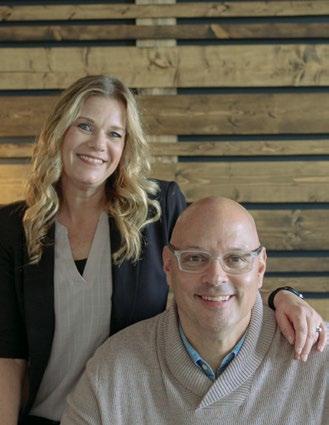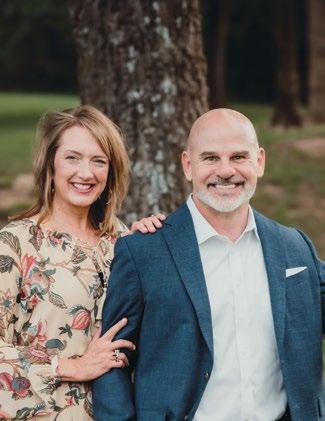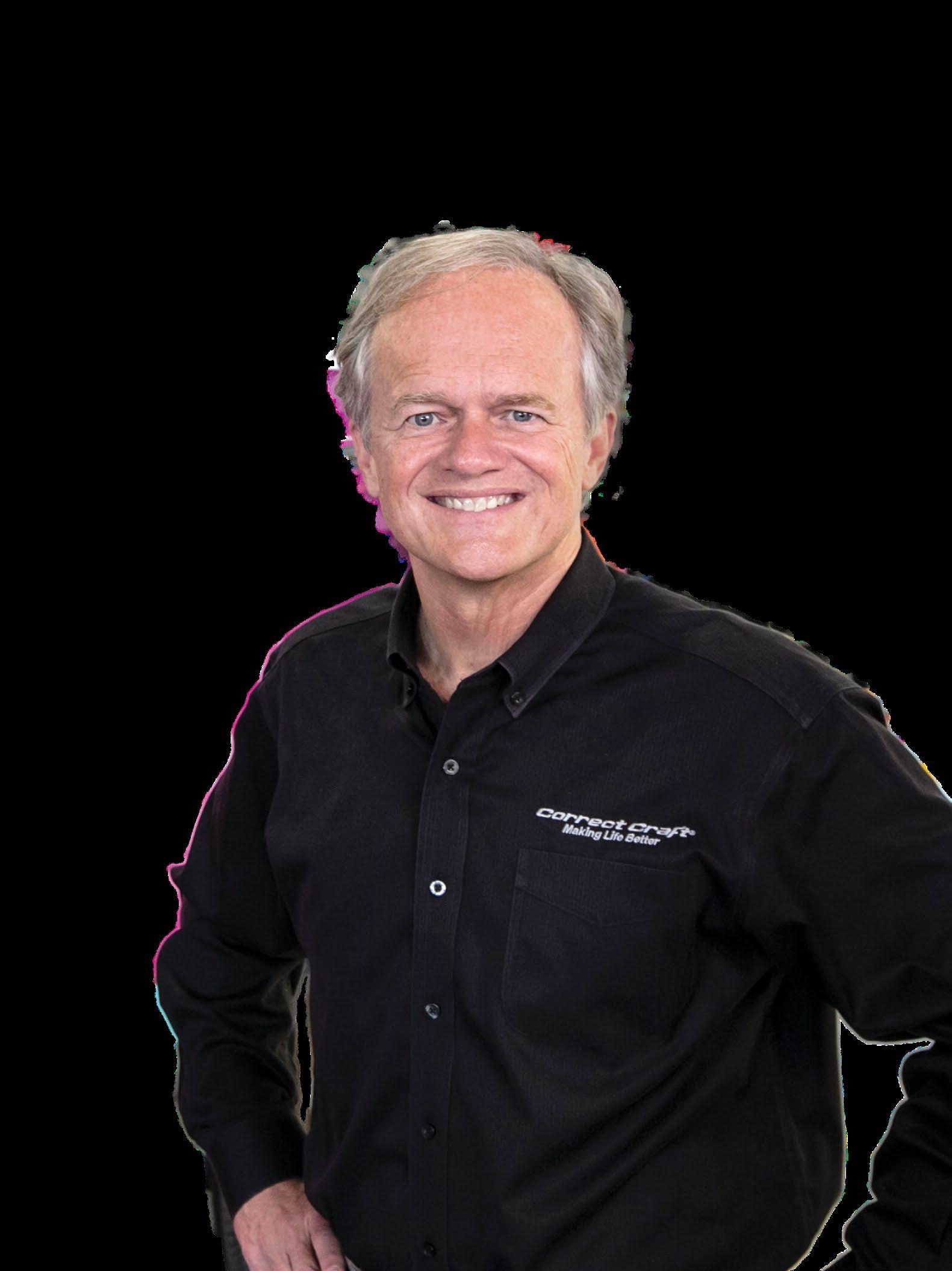
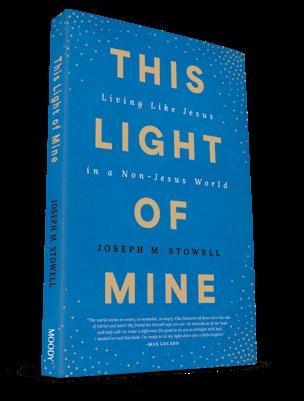

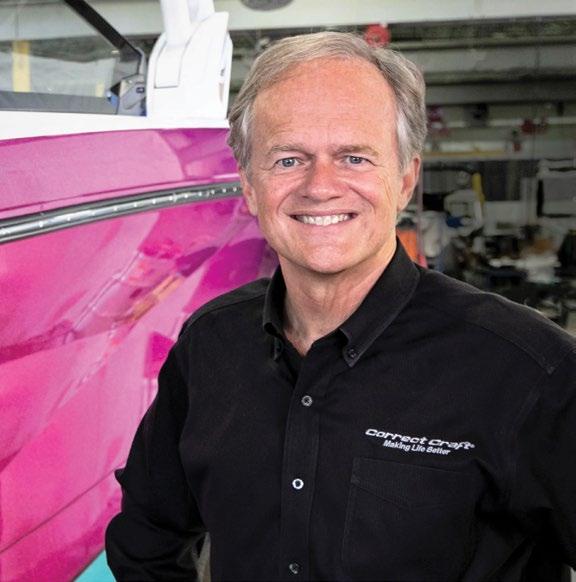


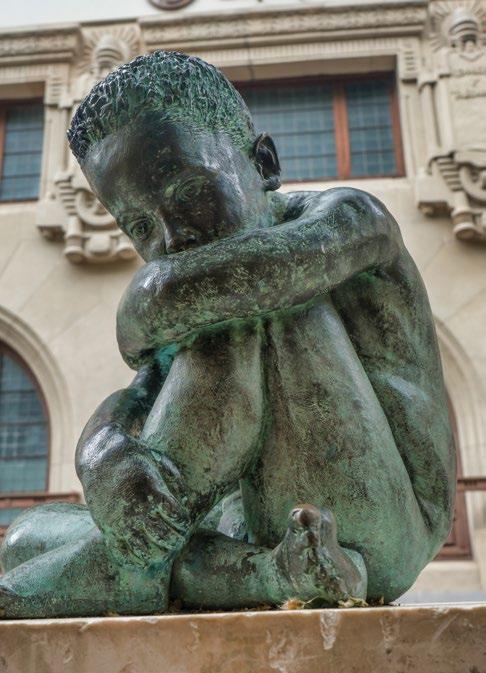









God’s plan for His church is amazing. He calls people from all tribes, tongues and nations, from all walks of life, from all different personality types to repentance. By His grace, He forgives us through the sin provision Christ made on the cross. Then He seals us with the Holy Spirit and welcomes us into His family so we will one day be raised to eternal life, just as Christ was. Isn’t that astounding?
He also gives us an assignment; to be His ambassadors, His light, His earthly envoys. We aren’t meant to fulfill our mission alone. We are part of a larger team working together toward the same goal – to glorify God – which includes meeting people’s needs and inviting them to join the mission.
Watching the church respond to those impacted by Hurricane Helene has pressed this home for me in a powerful way. Thousands of people lost family, friends, homes, vehicles, and more. Many watched their land, livestock and livelihoods being destroyed. The needs are, and will continue to be, almost overwhelming. God sees. God knows. God hears their prayers. Concerned citizens, local churches and reputable organizations are responding with open hearts and hands. Many are motivated by Christ’s love and are His ambassadors, His light, His earthly envoys. One person alone cannot address the needs. But as a team, we can ease suffering and, if God presents the opportunity, invite them to join our mission.
There are many Christian organizations and local churches who would be grateful for your prayers, your volunteer efforts, or your gifts. If you would like more information about getting involved, please visit our Facebook page.
Then the King will say to those on His right, ‘Come, you who are blessed of My Father, inherit the kingdom prepared for you from the foundation of the world. For I was hungry, and you gave Me something to eat; I was thirsty, and you gave Me something to drink; I was a stranger, and you invited Me in; naked, and you clothed Me; I was sick, and you visited Me; I was in prison, and you came to Me.’
Then the righteous will answer Him, ‘Lord, when did we see You hungry, and feed You, or thirsty, and give You something to drink? And when did we see You a stranger, and invite You in, or naked, and clothe You? When did we see You sick, or in prison, and come to You?’
The King will answer and say to them, ‘Truly I say to you, to the extent that you did it to one of these brothers of Mine, even the least of them, you did it to Me.’
— Matthew 25:34-40
In Christ,
Michelle Adserias, Editor
Today’sChristianLiving(ISSN 1944-6330) is published bimonthly by JP Media LLC, N7528 Aanstad Rd., P.O. Box 5000, Iola, WI 54945. Periodicals Postage Paid at Iola, WI 54945 and at additional mailing offices. Copyright © 2024 by JP Media LLC All rights reserved. Reprint permission must be granted in writing. Publisher assumes no responsibility for claims made in advertisements. Manuscript submissions are welcome but JP Media LLC assumes no responsibility for loss or damage thereto. Material accepted for publication is subject to such revision to meet the requirements of this publication and become the property of Today’sChristianLiving Subscription $19.95 per year. Single copy price $4.95 each. POSTMASTER: Send address changes to Today’sChristianLiving , P.O. Box 8551, Big Sandy, TX 75755-9766. Subscription problems and inquiries should be directed to (800) 223-3161.
President/Publisher
Diana Jones dianaj@jpmediallc.com
Editor Michelle Adserias michellea@jpmediallc.com
Contributing Editors
Walt Larimore, M.D.
Dave Ramsey
Jerry Rose
Shirley Rose
William Morris
Sales Account Executive
Jill Maggio jillm@jpmediallc.com 800-397-8161 ext. 5
Graphic Designer
Sara Wait
Bulk Circulation
Angela Gauerke angelag@jpmediallc.com 800-397-8161 ext. 2
Founder
Kenneth N. Taylor
Letters to the Editor: Write Today’sChristianLiving , PO Box 5000, Iola, WI 54945. Or e-mail: editor@todayschristianliving.org
Individual Subscriptions: Visit www.todayschristianliving.org/subscribe or call 800-223-3161.
Subscription Support: customercare@jpmediallc.com
Group Subscriptions for Churches: Expand and supplement your church’s ministry by distributing Today’sChristianLivingto your congregation. Multiple copies of the magazine are now available in bulk rates to churches. For more information, visit www.todayschristianliving.org/ bulk or call 800-397-8161.
Today’s Christian Living reserves the right to accept or reject advertisements based on their alignment with its statement of faith, mission, and values. Advertising in Today’s Christian Living does not necessarily imply editorial endorsement, nor does Today’s Christian Living guarantee or endorse content in independent websites.
Today’s Christian Living P.O. Box 5000 Iola, WI 54945
Phone: (800) 223-3161 www.todayschristianliving.org
Copyright 2024

By Stephanie Rische
As the CEO of a billion-dollar company, Bill Yeargin has spoken to large groups of people all around the world. His company, Correct Craft—known for building power boats—is 99 years old and has been named Florida’s manufacturer of the year. Over the past couple of decades, it has quadrupled in size, employing 2,000 people, with distributors in 70 countries. Each year, Correct Craft exceeds its goal of $1 billion in revenue. This success has opened the door for Bill to speak at hundreds of conferences on six continents and
to visit the White House nine times, meeting with presidents on both sides of the aisle.
While some people might leverage such a platform for fame or financial gain, Bill is most excited about the opportunity it gives him to share what’s most important to him: his faith. “Over the years, I’ve come to learn that there are a lot of people who would never set foot in a church or read a book by a pastor, but they would listen to something a business leader has to say. I want to use the platform I’ve been given to share my faith.”

In his latest book, Faith Leap, Bill Yeargin shares fascinating stories from his travels around the world to demonstrate how evidence of God is everywhere. He also uses the teachings and impact of Jesus to support why Jesus is God. On the pages of this book, he offers profound insights that will connect the reader with their faith in God, offer new ways to view God’s role in everyday life, and provide unwavering evidence about the truth of Christianity. Whether you’re a Christian, considering becoming one, or a nonbeliever, Faith Leap will expand your thinking and give you new perspective on what it means to follow Christ.
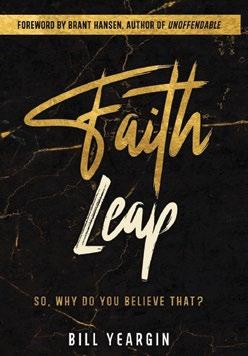
“Most people think we can have a relationship with God by following the rules and being good, whatever that means to them,” Bill says. “What I share in this book is that it doesn’t matter how good we are—we establish a relationship with God by trusting Jesus. We can never be good enough. If we try, we’ll find ourselves on a horrible treadmill that keeps speeding up as we try to meet God’s expectations and others’ expectations. Character is important, of course, but it’s not the key to relationship with God. Faith is.”
Jesus told Peter three times, “If you love me, feed my sheep.” Bill believes we love God by loving others. “We have this inclination to make it about us — what list of rules do I have to follow? But taking a faith leap is saying, Yes, we should live holy lives, but our relationship with God is what makes us right with him.”

Things haven’t always been smooth sailing at Correct Craft. When Bill took the helm 18 years ago, he was the fifth CEO in five years. “The company was a mess—it was losing money, and it was on the verge of going out of business.”
Shortly after Bill stepped into leadership, he made a surprising decision. He took 25 employees to Mexico to build a house for a family without a home. “I wanted to communicate to my employees the importance of culture. What we’re doing isn’t just about building good boats; we want to use our platform for good.”
Bill’s plan wasn’t immediately met with enthusiasm. “Almost everyone thought it was a dumb idea. We had so many problems at home that needed attention, and people thought this was a waste of resources. But I knew that if we were going to turn the company around, we needed a bigger purpose. Most people have an innate longing to do something meaningful with their lives. Yes, this trip was expensive and hard. It was hot, we slept on the desert floor, and we showered with lake water. But at the end of the trip, everyone said, “These were the best few days of my life” and “I’ve never done something so impactful.”
At the time, Correct Craft had 500 employees, and the positive buzz spread quickly. “When we got back, people saw that this idea of using our platform for good wasn’t just a theory; it was something we lived out. I would consider that trip the single turning point in the company. It energized everyone and gave us an identity as an organization with a culture of service.”

Shortly after Bill started at Correct Craft, he initiated optional Bible studies for employees, as well as community service opportunities. “It’s not just about big trips. We are intentional about serving in the local community and within the company itself. Our goal is to look through a lens of service and ask, ‘How can we use our platform to serve people internally, within the community, and around the world?’”
Since that first trip to Mexico, Correct Craft has taken teams to work sites around the world, including places like Cambodia, India, Kenya, Uganda, and Central America. They’ve also sent teams to community centers that serve people who are facing housing insecurity, recovering from substance abuse, or experiencing reentry after being released from prison. “We’re known as a philanthropic organization, a company that cares. Closer to home, when we have employees who are struggling, we are intentional about rallying around them, too.”
One nonnegotiable for Correct Craft is to align their philanthropy with opportunities for employees to serve. “It’s not just about sending a check; it’s about sending people, as well. It may be more expensive the way we do it, but it results in changed lives among our team. It’s impactful for our employees—and for their families too.”
Bill is accustomed to having people question his company’s value of giving back. Sometimes people ask him, “Isn’t it expensive to do this? Wouldn’t it be easier to just make a donation?” But Bill has a different perspective. “As a business, we think a lot about return on investment. When we do these trips, we don’t necessarily see fruit for a while. But we’re
looking for eternal rewards. This requires a mindset shift—we don’t think of it as an expense; we think of it as an investment. There’s nothing we can invest in that gives us a better return, eternally and culturally. It pays back in significant ways in the years ahead.”
Bill grew up in a Christian family and accepted Christ in sixth grade. “When I was in middle school, I went to a Christian school, and there was a strong focus on encouraging students, especially young men, to go into ministry.” In high school, Bill decided ministry wasn’t his calling, and he pursued business instead. “I’ve been told that 95 percent of churches are made of fewer than 100 people. There are a lot of people who won’t ever set foot in a church or talk to a pastor. I am so grateful for the work pastors and ministry leaders do that I’m not wired to do. But I’m also grateful that God has given me a platform to impact people who might not be reached within the walls of the church.”
One of the ways Bill reaches people outside the church is through his writing on apologetics. Bill’s dad died of Parkinson’s disease when he was just 65, and this loss prompted Bill to examine his beliefs in a new way. “Losing my dad never made me question my faith, but I did ask why. My dad was a good man and a deacon in his church. I kept asking, ‘Why him, God?’ This sent me on a path of studying apologetics and trying to understand my faith in a more substantial way.” Bill’s latest book, Faith Leap, was born out of this quest to go deeper into the whys of faith.

After almost two decades with Correct Craft, Bill’s values have remained the same: faith, family, service, and stewardship. Bill is married, with two adult daughters and a granddaughter, Rosie, who is two. “Family has always been important to me, but Rosie has been a game-changer. I’m willing to drop just about anything to spend time with her. We have regular Pap-Rosie dates, and I hope to continue doing that as long as we can.”
As Bill looks to the future, he has a vision for continuing to grow Correct Craft. “I want to be a good steward for the assets we’ve been given. Growth provides opportunities and a bigger platform, which in turn can be used for good.”
While speaking at a college graduation ceremony, Bill passed on this wisdom to the next generation: “Most people
chase rewards, but it’s much more fulfilling to chase impact. The things we think will give us joy and happiness simply don’t deliver. If you seek happiness through financial gain, you’ll discover there’s no amount of money that can satisfy. But when you chase impact, the rewards take care of themselves. When we serve others and do good, we experience true satisfaction.”
As the last two decades at Correct Craft prove, Bill is someone who chases impact. God is using his influence for the Kingdom—in his family, in his company, in his community, and around the world.
Stephanie Rische edits and writes in the Chicago area, where she lives with her husband and two sons. When she isn’t chasing down commas or little boys, she blogs at stephanierische.com.
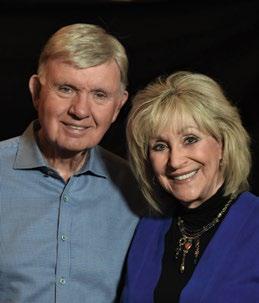
Jerry Rose is an internationally known Christian broadcaster and is former president/ CEO of the Total Living Network. He currently serves as TLN’s chairman of the board and hosts the Emmy awardwinning program Significant Living. Jerry is an ordained minister and the author of five books, including Deep Faith for Dark Valleys and Significant Living, coauthored with his wife, Shirley. He is the past president of the National Religious Broadcasters and currently serves on its board of directors. Jerry is an avid golfer, equestrian, photographer, and grandfather of 20.
Shirley Rose has been in ministry with her husband, Jerry, for more than 30 years. Her career in Christian television focused on hosting several programs, including the Emmy Award-winning women’s program Aspiring Women. She has authored five books, including The Eve Factor, A Wise Woman Once Said…, and Significant Living, and has contributed to numerous anthologies and periodicals. She is actively pursuing her calling to help other women through writing, speaking, and hosting women’s groups in her home. Her favorite pastimes are country line dancing, travel, and spending time with her 20 grandchildren.
By Jerry and Shirley Rose
There is a great story about the famous black American scientist and educator, Dr. George Washington Carver. As a young man Dr. Carver prayed for God to show him the secrets of the universe. God spoke to him and said, “Little man, such a subject is far too much for your little mind.” So, he then asked God to reveal the secrets of the earth. Again, God said, “Such a subject is far too great for your little mind.” Finally, Dr. Carver says he prayed and asked God to reveal to him the secrets of the peanut. God answered and said, “Now that is a subject more your size.”
Dr. Carver took God at his word and, over his lifetime, developed over three hundred products from the peanut. Depending on God wasn’t new to Dr. Carver. Even as a child he exhibited a strong God-awareness that continued throughout his lifetime.
Unfortunately, the idea of dependence on God is foreign to much of our society. Perhaps that’s the reason the world is in such a mess.
A few years ago, as part of a series we were producing at TLN, we took our cameras to the street and randomly asked people, “How important is God to you?” While some said, “very important,” many others said, “Not very,” or “I’ve never really thought of God as being important to me.”
I feel bad for people who have never learned to depend on God. Putting your trust in God provides a secure foundation, a sense of confidence that sustains you through life’s mountaintops and valleys. One writer said, “Security is not the absence of danger but the presence of God no matter what the danger is.”
During our 48 years of TLN leadership, more than once we felt we had reached the end of our human ability. We didn’t know how to keep the ministry going. Like Dr. Carver, our little minds were too small to find the answer. But we knew there was no limit to God’s knowledge and power, and we turned to Him for answers and a way out of our dilemmas. Time and time again He provided that miracle. Not only has the ministry survived but today TLN Media, with fresh vision and leadership, is expanding nationally and internationally, touching the lives of millions around the world. From the beginning of the ministry our key scripture has been “The battle is the Lord’s” from l Samuel 17:47. It has helped
us focus on God and trust Him, rather than being limited by our own abilities.
When our dependence is on God as our deliverer, we are freed from the bondage of circumstances. I like David’s “Declaration of Dependence” in Psalm 22:5. ”They cried to You, and were delivered; They trusted in You, and were not ashamed.”
David’s confidence in God was real, not just a shallow declaration. Unlike the minister who said, as he stepped into the pulpit on a Sunday morning, “I forgot my notes this morning, so I’ll just have to trust God for guidance, but be assured I’ll be better prepared tonight.” Yes, we must prepare and work hard but know that our success ultimately depends on our trust in God.
Just like Dr. Carver, our human minds are far too small to deal with all the challenges of our world. As Christians we face enormous pressure in an increasingly godless culture. That pressure can tear us away from our spiritual moorings. It is vital that we develop a greater dependence on God than ever before. Proverbs 3:5,6 encapsulates dependence on God.
“Trust in the Lord with all your heart, and do not lean on your own understanding. In all your ways acknowledge Him, and He will direct your paths.”
How do we achieve that kind of trust and dependence? We must go back to two basics: Prayer and God’s Word.
Knowing about God and the promises He has made can help us to trust Him and depend on His leadership. Through prayer we deepen our relationship and the ability to hear His voice. We find peace, direction for our lives, answers to our questions, and power to overcome temptation.
Dr. Carver’s dependence on God not only helped him discover amazing uses for the peanut, his ingenuity literally changed millions of lives.
During this season of New Year’s resolutions and new beginnings, I encourage you to make a commitment that will change your life. Determine to deepen your relationship with God. Even if you have served the Lord for years, make your relationship with Him your highest priority. Make your declaration of dependence. Start depending on God each day for large and small decisions and thereby release the power and potential for spiritual greatness that God intends for you.

By J.L. Green
I stood staring at the old, wall-mounted rotary phone in my father’s townhouse in Columbus, Ohio. It was October of 1974, and my home life was crumbling around me. I had reached the point that I felt running away was my only option. But before leaving, there was one more possibility. It was a long shot, but with my alternative being the open road and homelessness it was at least worth a try.
My last, best hope was David.
The Lakeside School for Underprivileged Children, or just Lakeside as we called it, wasn’t an orphanage in the strictest sense. Many of the hundred and fifty kids housed on its hundred-acre campus had parents or families of some sort. It was where the state of New York put many of its most challenging cases—kids whose parents were incarcerated or unfit or incapable of caring for them. Kids who were judged unsuitable for foster homes, often because they’d suffered some of the vilest kinds of abuse.
That last category was me. The New York Child Welfare Service (now the New York Office of Children and Family

Services) recognized three classifications of child abuse: physical, emotional, and sexual. Between the ages of three and twelve, I was placed with two different family members and eight different foster homes. During my time in those various placements, I experienced all three types of abuse, sometimes all in the same home.
And so, at the age of twelve, in the summer of 1970, this pedigree earned me my place at Lakeside and my introduction to David Edward Hanson, DSM (Doctor of Sacred Music). Dave was the Minister of Music at Grace Conservative Baptist Church in Nanuet, New York. Every Sunday morning and Thursday night, Grace Baptist’s old Chevy van would drive up the hill at Lakeside and load up with kids.
David was known far and wide for his musical talents. In addition to a tremendous portfolio of sacred hymns he had penned, he was also a gifted choral director, pianist, organist, and singer. Each Christmas and Easter, capacity crowds would show up for his productions, most notably Handel’s Messiah with its huge orchestra and choir.

A mentor to innumerable young people, he would spend countless hours teaching them, enabling them to realize their full potential as musicians. Though I made it a point to attend as many Thursday night chorale practices as I could, music was never the connecting point between Dave and me. I didn’t play an instrument and my voice was painfully unimpressive. Thankfully, his giftings didn’t end at the music room doorway.
At any given time, Dave could be found in the company of young men who shared one overriding commonality: They were broken people. Dave was a magnet to many of us kids, most of whom had never experienced a solid Christian male role model. With him, we always had someone to talk our problems out with, someone who would listen and who cared enough to tell us when we were wrong – and do it in a way that made us want to do right.
David was also known for his great love of the outdoors. Whatever the sport, whatever the time of year, if it was outdoors, Dave was up for it. Bicycling, tennis, and hiking were usually at the top of his list. I have many fond memories of our numerous hikes throughout the Catskill region. But
what many of us waited so anxiously for were the summer canoe trips.
Every year, in July or early August, we loaded up the church van and a couple of other cars and headed to upstate New York or Canada. Some of my best childhood memories are from those long, sultry, unhurried summer days paddling through the waterways of the great north woods.
I benefitted greatly from those group trips but I came to cherish my alone time with Dave the most. There is an old idiom that says: “We are the only Bibles some folks will ever read.” I’m normally not a fan of overused Christian cliches but, in my eyes, Dave actually lived that one out. There were many admirable qualities wrapped up in him but it was his calmness, even in the most stressful moments, that left the biggest impression on me.
Dave had an incredible sense of peace about him. All the dark happenings of my childhood had left what felt like a raging storm inside of me. Being around someone like David was like coming in out of the rain. There is not much I wouldn’t give to be back on Lake Tiorati in his canoe, fishing lines trailing behind us, lost in conversation on the deeper issues of life and the mysteries of God.

When I arrived at Lakeside, I thought my days of bouncing from home to home had finally ended. But certain policies of the New York Child Welfare Services were about to put an end to those thoughts.
The agency’s guidelines were to place kids with their biological parents when they could. Though they never located my mother, they did find my father when I was fourteen and flew me to Columbus, Ohio to meet him that summer. When I turned sixteen, they decided I should live there permanently.
I had been at Lakeside for four years by then, a huge chunk of time for a kid and the longest I had ever been in one place in my entire life. I had, for better or worse, come to think of it as home. But there I was, bags packed and bus ticket in hand. I was having to leave my friends and church to move halfway across the country to live with someone who was little more than a stranger to me.
It took only six months before my relationship with my father fell into total ruin. But in the midst of all the turmoil, God was showing me something. There’s a verse in Deuteronomy that says, “I have set before you life and death, blessing and curse.” My dad was an example of a life without Christ, which was death. While Dave was the example of a life with Christ.
As I made the call that October day, spinning out each number on the rotary dial, I felt like I was choosing life. But would Dave see it that way? Would he be willing to take me in? When he answered the phone, I explained the situation and asked if I could stay with him.
Many years have passed since then but I don’t recall him taking more than a few seconds to answer. Yes, he was willing. Not only that, but he also contacted the state and filed paperwork to become my legal guardian. It turned out to be the most impactful phone call of my life.
Psalm 68:6 says, “God sets the lonely in families.” That scripture came to life for me that day. In Dave I found a surrogate father. For many years since, through all the ups and downs of life, he was always there for me — just a phone call away.
On January 7, 2012, after a two-year struggle with pancreatic cancer, Dave graduated to heaven. He passed peacefully, surrounded by his family.

J.L. was born in Columbus, Ohio, but grew up in various foster homes and orphanages in the NY metro area. He’s been a paratrooper, private investigator, beach bum, carpenter, standup comic, and incurable wanderer. Now retired, J.L. is living in Yakima, WA.
Aman was accused of murder and brought before a judge. The man admitted his guilt, the jury found him guilty, and the judge pronounced his sentence with deep sorrow: the death penalty.
The guilty man was his own son. Despite the judge’s deep love for him, he could not dismiss the charges or avert the penalty. He must uphold the law or be a corrupt, unjust judge.
He was caught in a heart-wrenching dilemma. Then he thought of a solution. The judge stepped down, removed his robe, and exchanged places with his son. He was executed in his son’s place.
That’s what Jesus, in His grace and mercy, did for us when he died on the cross. He was not guilty but paid the penalty for our guilt; he was sinless but paid the price for our sin.
God’s forgiveness is available to anyone who will own, ask forgiveness for, and turn away from their sin (repent) and put their hope, faith, and trust in Christ alone. Only His blood, shed on the cross, can wash away the guilt of our sin so we can forever enjoy God’s forgiveness and fellowship.
The question is, will you accept God’s free gift? It’s only a sincere prayer away. If you’d like to find new life in Christ, tell God you are sorry for your past wrongs and want Him to be your Lord and Savior. He’ll send the Holy Spirit to live in you, guide you, and change you from the inside out.
“It is by grace you have been saved through faith — and this is not through yourselves, it is the gift of God — not of works, so that no one can boast” —Ephesians 2:8-9.



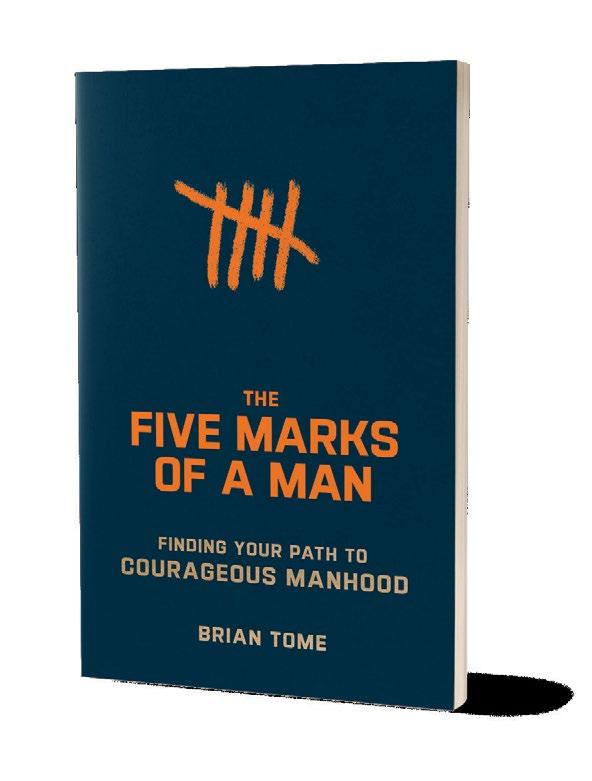



By Emily Powell
Exhausted, worn down, rejected, misunderstood, weak…
These are not words you typically think of when considering a hero. Especially a hero of the faith. But these words are relevant and, in fact, inspiring to me as I think about my own walk with the Lord and the journey He has been gently walking me through. It’s easy to believe that walking with the Lord will be stress-free and filled with more dancing and laughter than mourning and uncertainty. But when we look closely at those who have gone before us, we are met with the reality that walking with Jesus is filled with more people

who are exhausted, worn down, rejected, misunderstood, and weak.
Maybe you, like me, feel this way even as you read these words. Perhaps you are reading this because you need a glimmer of hope that things will be better; that there is light at the end of the tunnel. My dear friend, let me introduce you to a woman in the Bible who has encouraged me to be brave even when life is full of adversity. This woman does not have a name. In fact, she gets less than 10 verses of airtime in the Gospels. She may not be your first pick for “heroine,” but let me explain why she is mine.
Interwoven in Mark 5 we find the story of Jairus’s 12-yearold daughter, who has fallen deathly ill, and the woman who has been bleeding for 12 years. We do not know her specific condition. A ll we know is that this woman was bleeding for a very long time and she spent all of her money trying to find a cure, only for the condition to continue growing worse (Mark 5:25-26).
According to Jewish Law, this condition deemed her ceremonially unclean (Leviticus 15:25-27) and prohibited her from entering the temple to engage in ceremonies her fellow Jewish friends participated in. Imagine how exhausted she must have felt, her body fighting her every move, likely causing her to

be physically weak. Her disease made her unclean, unable to be touched, unworthy to be hugged or feel loved, leaving her feeling rejected, no doubt. I imagine she also felt emotionally weak and vulnerable, maybe frustrated or overwhelmed by her circumstances. Nothing she did helped. Until one day, a Jewish man – rumored to be a healer – came through her town.
This was her all or nothing moment, that “I’m giving it one last chance” moment. She had tried everything, everything. But everything didn’t satisfy her needs. Everything didn’t bring her healing from the pain, humiliation and filthiness she had experienced for the last 12 years. There was only one thing she had not tried to this point. Could the rumors be true? Could this man be the Messiah? Could this man bring her the healing her exhausted body desperately needed?

Pressing through the crowd of people who had likely rejected her in the past, making every person she touched ceremonially unclean and causing people to panic and become upset; she used the strength she had left to reach out and just touch the edge of his garment. Inconveniencing the ruler of the synagogue–taking away what seemed like precious time to Jairus as his 12-year-old daughter grew sicker with every passing moment–she bravely, boldly, desperately, reached for her Messiah in faith.
Instantly, she was healed! In that same moment, Jairus’s little girl grew cold and limp. Life given to one. Life taken from another. Jesus stopped.
Knowing power had gone out of Him, He looked around, asking who had touched Him. He temporarily stopped the mission to heal one, to acknowledge the healing of another. Knowing what had happened to her, trembling in fear, she fell down before her Savior and told Him the whole truth (Mark 5:33). She left nothing out. She didn’t try to make excuses. She didn’t try to dance around the truth. She spoke to Him all that had happened. She uncovered herself, metaphorically throwing off her bloody, stained garments, and allowed Jesus to cover her with new, clean clothes. Jesus tenderly looked at this brave woman who exemplified great faith and called her “daughter.” At the same moment, Jesus sent off His new “daughter of the faith” fully healed and in peace, people from Jairus’s house informed him his daughter had died.
I imagine what the woman of blood must have felt at that moment. Perhaps she was so consumed with her own healing she did not even hear the messengers’ words. Or possibly, she felt overwhelmed with guilt for interrupting Jesus from healing a small child. Or maybe she had enough faith to believe that if He could do it for her, He could do it for anyone. We don’t know. But we do know that not only did Jesus heal her instantly, He also stopped and took the time to acknowledge her, to call her daughter, to let her know why she had been healed: her faith.
There are many reasons I can relate to the woman of blood. I have suffered with endometriosis since I was 18 years old. I was misdiagnosed for years before learning I had been bleeding internally, without any sort of treatment. As I write this to you, I still suffer with pain but have ongoing hope that one day, by faith, I will be healed — whether here on earth, or eternally in heaven.
I have suffered through two cancer diagnoses, undergoing surgeries that have removed pieces of my body to save my life, leaving me unable to have more children naturally, unless a miracle of God makes it possible. These trials and more have left me feeling incredibly exhausted, worn down, weak, rejected, and misunderstood. I have endured storm after storm in my life. This story is always the one I return to when I require the reminder that we are healed by faith. And I’m not talking about physical healing, though when Jesus miraculously heals us, it is such a beautiful and marvelous thing. I am talking about
the complete, instantaneous, full healing we receive when we respond to the Lord in faith.
Just a mustard seed is all it takes. Faith that not only hopes but faith that works. Faith that is shown through a small action, stepping out into the unknown, trusting the Messiah will fully cleanse you of all your filthiness, of everything that makes you unclean and unfit for the Kingdom of Heaven. This kind of faith happens only when we reach the end of ourselves, when we’ve tried everything else but our condition or circumstances continue to get worse. This kind of faith reaches out, despite what everyone is saying about you, despite how inconvenient it may feel, despite how exhausted you are. This kind of faith gives me hope that, though I have suffered, I am still called “daughter.” Though I am weak, I can depend on His strength. Though I am nothing, He is now my everything. No longer my last resort, or final solution, but the only one I run to for strength in the storm.
It’s this kind of faith that gives me the strength to press on when my circumstances are grim and it feels like I can’t make it through another surgery. This faith strengthens me when I receive the news of yet another family member diagnosed with cancer or am reminded that my body cannot do what it should be able to do, or when I am desperately trying to help my only child through the dreadfulness of depression. I cling to this story of a woman who, despite her circumstances, risked it all, by faith, to meet a gracious, unhurried, loving Savior who calls the unclean “daughter” and has enough power to save all, not just the one.
I love this story not only because I feel a connection to the woman with the blood. I love it because Jesus takes time and power to heal and to save her, then continues His journey to heal and save the little girl. Jesus uses the pain of these two daughters to show multitudes of hopeful onlookers who, no doubt, have their own tragedies and situations that need a miracle, the result of true faith: complete and instantaneous healing. We can be right with God, washed clean by His blood — an exchange that is worth the risk.
It is this woman who inspires me to be brave. It is this woman who reminds me that Jesus can take an outcast and make her a daughter.

Emily is a wife and mother. She is a graduate of Liberty University and is currently pursuing a degree at Dallas Theological Seminary. Emily recently accepted a Prayerline Associate position with the Billy Graham Evangelistic Association. She and her husband, Jared, are the founders of a small house church in Northeast Ohio, where they are passionate about making disciples.


from New York Times bestselling author Joyce Meyer











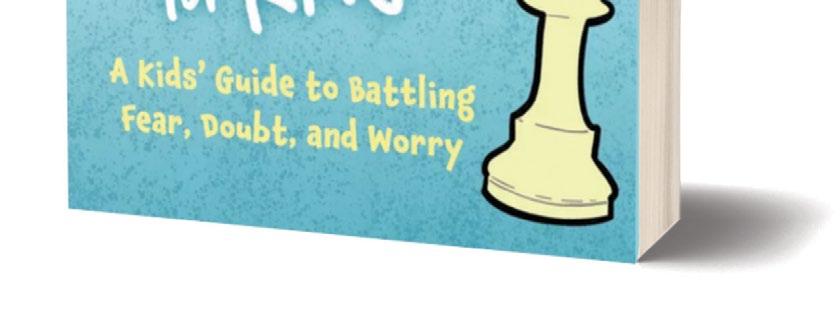

MORE THAN 7 MILLION COPIES SOLD









Newly updated anniversary and kids’ editions coming February 4, 2025!

By Ree Pashley

“Faith by itself isn’t enough. Unless it produces good deeds, it is dead and useless.”
— James 2:17, NLT
Eloquent speeches and passionate advocacy can motivate crowds and inspire change. But for a person to be a true hero, there must be extraordinary action — often at great personal risk. That is why my spiritual hero is a 12-yearold boy who died nearly 30 years ago.
I could certainly name a wiser, more learned individual — probably someone who authored books or penned essays on the Christian life. I could point to several adults who challenged my theology and encouraged deeper intimacy with God. But when it comes to sacrificial actions that have motivated me to live out my faith — not just talk about or study it — Iqbal Masih stands apart.
Other than our shared faith, I have little in common with this Pakistani child but his life is a stunning example of Christ’s call to sacrificial love and the truth that our spiritual beliefs only matter when realized by practical actions. Decades after his death, Iqbal’s story has indelibly changed how I live as a Christian.
I first learned about Iqbal (pronounced ik-baal ) through an article mentioning him as the youngest recipient of the Reebok Youth in Action Award, back in 1994.1 It was one of the first times a brief biography brought tears to my eyes. Since then, I’ve read fiction and non-fiction books based on his life.
Sold into slavery at the age of four, Iqbal worked for a ‘carpet boss’ under Pakistan’s illegal Peshgi 2 system. According to this form of bonded labor, Iqbal was working to pay off his parent’s debt, which amounted to approximately $12.00 (600 Rupees at the time). However, under the Peshgi system’s hidden ‘costs’ of feeding, housing, and teaching the child a trade, the debt would never be repaid and the child would remain in bondage. Despite Peshgi being outlawed, it was a common practice the Pakistani government often ignored.
Iqbal’s labor was to create beautiful woven carpets in terrible conditions for up to 14 hours a day. He worked alongside other children in a dark, locked carpet factory. The children were often chained to their looms, deprived of food and water and punished with beatings. It was not uncommon for them to go days without seeing the sun.
However, when Iqbal was ten years old, everything changed. He found his way out of the carpet factory and into a meeting held by the activist group “Bonded Labour Liberation Front” (BLLF)3 which helped him escape the carpet factory once and for all. Through BLLF, Iqbal managed to obtain a “Letter of Freedom” and helped free the other children enslaved at the same factory.
Iqbal began living at the BLLF headquarters in Lahore, Pakistan and started learning to read and write. He soared through his studies, completing four years of education in just two. He dreamed of becoming a lawyer. Through BLLF, Iqbal gave speeches locally and internationally to end child labor and encouraged children to break free of bondage. In 1994, he spoke at a labor conference in Sweden where he received the previously mentioned Reebok Youth in Action Award, 4 which allowed him to travel to the United States and continue raising awareness about the oppression of children in Pakistan.
Back in Lahore, it became increasingly difficult to obtain enough evidence to convict carpet bosses and end the oppressive cycle of Peshgi. The BLLF struggled to shut down carpet


(photo
factories using children in bonded labor because the “Carpet Mafia,” which had accumulated a great deal of wealth using child labor, wielded their influence and corrupt police officers accepted bribes to ‘lose’ or destroy evidence and even returned escaped children back to slavery.
Iqbal was now free and certainly doing his part to advocate against child slavery but he wanted to do even more. So, he volunteered to do something outrageous: to go back to the carpet factories, as a slave. From the inside, he could win the confidence of the other children, help them escape, and obtain the necessary evidence to bring down the carpet bosses. Despite all the risks, and the assurance of abuse and hunger, Iqbal willingly became a slave again.
Incredibly, the undercover plan worked! Iqbal was instrumental in freeing the children and getting the factory closed down. So, he did it again — and again. It is estimated this young Pakistani boy had at least 30 successful undercover “rescue missions” and helped to free over 3,000 other children from slavery.
I still tear up every time I read that number: 3,000 other children. All because that young boy chose to surrender his freedom to save others. He could have just given speeches and traveled the world as an advocate for children’s rights. Iqbal could have lived a long, comfortable life and still be doing good, with speeches and a law career. But it is not his words that make Iqbal Masih my spiritual hero; it is his actions. He surrendered his freedom, safety, education, and even basic human rights so other children could also be free. This so clearly follows the example of Jesus Christ, who laid aside His rights and His glory to set humanity free for all eternity.
It seems ironically fitting, then, that (allegedly) a member of the ‘Carpet Mafia’ shot and killed Iqbal on Easter Sunday; April 16, 1995.5 He had received previous death threats but was undeterred in his mission. Iqbal was visiting his family for the holiday. He was killed while riding a bicycle with his cousins.
Iqbal did not just talk about ending child slavery — he entered into bondage to set others free. I am not called to go undercover in a carpet factory and I have not had the oppor-
tunity to help a child escape slavery, but my faith, too, must be realized with deeds. Otherwise, what good is it?
What does it matter if I have a sound understanding of transubstantiation or can recite all of Psalm 119 unless I practically love those around me? I could spout all the scripture verses I want, but unless I show love in practical ways, I might as well be an alarm clock. (1 Corinthians 13:1) To summarize the words in the book of James: what good is my faith, without actions to match it? (James 2:17)
So, when I feel overwhelmed by the number of children in my front yard or exasperated that my kids have given all the snacks away to the neighbors — again — I remember Iqbal and my focus comes back to what matters: the Kingdom of God, things of eternal value, and what honors Christ.
This young Catholic boy’s story reminds me that my beliefs (no matter how strong), my words (no matter how powerful), and my theology (no matter how correct), only carry value when coupled with action. Iqbal inspires me to do more, not just preach more. He challenges my high ideals with practical implementation. He, post-mortem, calls me to throw open my pantry for the children in my neighborhood and pay attention to the students who need shoes for school.
Iqbal Masih’s story brings me back to the basics of the Christian faith: I have been rescued by Christ through grace, and in response, I am called to love God and love others beyond what is convenient or comfortable. For Iqbal, that meant returning to slavery. For me, it means meeting the needs of the children in my sphere of influence; those in my family and those God has placed around me.
He may have only lived for twelve years, but Iqbal’s life has changed mine. I cannot read of his sacrifice and be content with a feel-good sort of faith. The child who willingly went back into slavery in order to save others inspires me to walk out my faith with practical actions; to love others as Christ has loved me.
1. “Human Rights Youth in Action Award” (PDF). Archived from the original (PDF) on 2016-03-10.
2. Dr Fraser Murray, Samanthi Theminimulle, Nida Mustaq. “Modern Slavery in Pakistan” (PDF) Published August 2019.
3. Wikipedia Page: Bonded Labor Liberation Front. https://en.wikipedia.org/wiki/Bandhua_Mukti_Morcha https://assets.publishing.service.gov.uk/media/ 5e56a35a86650c53b6909337/DFID_Modern_Slavery_in_Pakistan_.pdf
4. Kamran Chaudhry, UCA News. “Late Catholic activist wins Pakistan’s highest bravery award”. Published March 25, 2022. https://www.ucanews.com/news/late-catholic-activist-wins-pakistanshighest-bravery-award/96655
5. Francesco D’Adamo, “Iqbal”. Published 2016 by Simon & Schuster.

Ree Pashley is a freelance writer based in Tanzania, East Africa. She is an adoptive, biological, foster, and stepmom to eight kids (and an aunty to a lot of neighborhood kids, too). She loves Jesus, hiking, and coffee.

“No, I’m not interested in your list of endangered vegetables – just eat your supper.”

“Go for it. She’s said she wanted to get her hair colored.”
By Jason Gray and Jess Woller, Hilary Griffith (Illustrator) [Centricity Music]
Ellie worries constantly. She worried about her little brothers making her late, forgetting to bring her lunch to school, or getting teased about her stutter. When her desk was moved next to Annabelle’s, she had more to worry about than ever. One Sunday morning, Ellie heard about how God cares for the sparrows and something started to change.

This engaging, hardcover picture book reminds children they can trust God in the face of anxiety because He loves them and constantly cares for them. It also teaches young readers to have empathy and compassion toward others – the value of responding to meanness with kindness and cruelty with love, based on passages from the Old and New Testaments.
Iwas a bit of a teacher’s pet as a kid. I listened attentively and prided myself on always having the right answers. I was honestly probably a bit annoying!
One day when I was five or six, our Sunday School teacher taught us that Jesus had three jobs: a teacher, a preacher and a carpenter.
I made careful mental note of this. Later in class, she asked us what Jesus’s three jobs were. I eagerly raised my hand, ready to impress. When the teacher called on me, I proudly recited my answer: “Jesus was a teacher, a creature and a carpenter.” The word preacher was new to me!
Submitted by Jillian Bell
If you have a joke or funny story you’d like to share, email editor@todayschristianliving.org. If we print your joke, we’ll pay you $25.

Hundreds of Christian books cross my desk each year. Fiction and non-fiction books, books for kids and young adults, Bible studies and devotionals, memoirs and biographies – books that encourage, entertain, teach, or address issues we, as individuals and the church at large, face as we walk through life. The pooled knowledge and experiences of so many people, who truly desire to know God, is nothing short of amazing.
It pleases God when we tell our story, when we take the life experiences and good gifts He has given us and share them with others. Here are some resources that can help you improve your writing skills and add your story to the annals of the ages.
“Through Him then, let’s continually offer up a sacrifice of praise to God, that is, the fruit of lips praising His name. And do not neglect doing good and sharing, for with such sacrifices God is pleased” — Hebrews 13:15-16

By Mackenzie Ryan Walters [Faith Storytellers]
Every Christian needs this guide on how to craft their experiences with God into a personal story and testimony! By a national award-winning journalist. Includes 40 short stories to enjoy! You can find it at https://www.faithstoryteller.org





The Noah Webster 1828 Dictionary contains comprehensive definitions that include the full etymology of words, traces roots in up to 26 languages, and many Biblical and classical references. This invaluable resource will help you become more effective in your writing and communication.
Visit FACE.net/1828 or call 800-352-3223 to learn more and to order.

The Foundation for American Christian Education

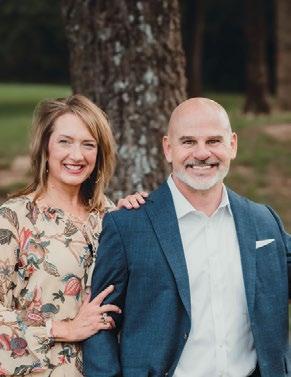










Amannda (Manndi)
Maphies works at the UMKC School of Pharmacy, is a mother to two human boys, two furry boys (Atlas, a cockapoo and Hamilton, a black cat) and enjoys freelance writing based on her travels, life adventures, and pretty much anything that stands out in life as ‘story-worthy’. Manndi contributes to several online and written publications and has been published in Chicken Soup for the Soul: Believing in Angels (January 2022). Her first book, Tales from My Mummy, can be found in local bookstores (SW Missouri) and on Amazon.
If you have a turning point in your life you would like to share, email your story to editor@ todayschristianliving.org
All submissions must be under 800 words. If we print your story, we will pay you $75. We reserve the right to edit for length and content. All submissions become the property of Today’s Christian Living
As a writer, I am no stranger to the dreaded ‘R’ word. Rejection. That’s a No. Not for us. Keep trying. Don’t give up — or maybe, find another hobby.
I have received far more rejections than acceptances. You would think that would wear down a person’s psyche and cause them to give up, stop trying, throw in the towel. Perhaps in some arenas of life that might be true. But if something is your passion, your calling, your soul’s language, and heart’s desire, rejection is simply redirection — to something better.
Many of the places I pitch articles have a canned response if a piece is not selected. Something to the order of ‘while this piece does not suit our audience, it is not a reflection of your writing, but rather an invitation to pitch your work elsewhere’.
By Amannda G. Maphies
unemployment, laziness, depression, or some other life-choking stronghold. The thing is, the message we bring will not always be welcome. It may fall on deaf ears. It may be regurgitated back in our faces in a hostile and desensitizing manner. Or, it may actually take root and grow, producing a harvest we never could have dreamed possible.
Just because a message is not fit for a certain audience, does not mean it is not a worthy message. Just because we are rejected by some does not mean we are not absolutely, positively, undeniably desired by others. You see, many times it is not the message that fails. It is the soil in which it is planted — obviously an allegory for the open-mindedness and softheartedness of those we hope to reach.
“The only way to adequately live life is to stand out.”
A flowery way of saying, “you are not for us.” Those responses used to gut me. Hurt my feelings. Make me want to throw things and cry. Now, however…
I realize that writing is an allegory for life. Guess what? Not only is my passionate hobby not for everyone, neither am I for everyone. And after years of trying to fit in, be like everyone else, blend in with the crowd, I realize that the only way to adequately live life is to stand out — like a sore thumb of insatiable passion and fortitude.
Even Jesus, the great minister of God’s Word, spread a message of life, truth, goodwill, and the one way to achieve eternal glory. Did His message resonate with everyone? Far from it. In fact, in one of His notable parables, found in Matthew 13, He spoke of a farmer planting seed. Some fell on the road and the birds quickly guzzled it up, leaving no seed behind. Other seed fell in shallow soil, without the roots to sustain its growth. Still other seed was violently choked by thorns. And finally, the remaining seed fell on fertile soil, producing a crop that far exceeded that which was planted.
Guess what, friends? We are the farmer! Whether we are spreading the good news of Jesus or some self-help discovery we have made in our personal lives, we are attempting to heal or change the lives of our loved ones who are struggling with addiction,
This realization, this magical “Aha!” moment, has positively changed my life. It brings such freedom and peace. I used to hate it when folks didn’t like me. I mean — I’m great! What’s not to like?! But now — now I realize the issue is not always with my personality, my demeaner, my message and my passion. It is that others’, based on whatever life experience, current situation, or modern mindset, are simply not attuned to what I bring to the table. Nor am I always open to what others (who may in fact be full of truth, wisdom, and inherent knowledge) bring to the table at which I sit.
Life is all about timing. Choices and timing. A perfectly timed message, prompted by the Holy Spirit, can move mountains. A badly timed message, or pushing a theme on unopen ears, will do nothing but cause bitterness and angst in both the presenter and the recipient.
My words may not be for all audiences, platforms, publications, magazines, blogs, or even books. But for the few they reach, those fertile folks of healthy soil, I am hopeful they make a difference. Realizing I do not have to penetrate the hearts of all readers, whether in word, deed, action, or lifestyle, has given me a freedom to simply listen to that still, small voice, and merely hope that the timing and presentation of my message lands on fertile soil, or rather, a heart broken wide open and ready to receive a divine blessing of healing.
The big gift-giving season is now behind us but as we venture into the new year, there are many excellent, freshly published resources available to help us remain strong as we walk with God, including some beautiful, newly released Bibles. Perhaps one of these books will speak to something you are facing right now. Perhaps you know someone else who could benefit from a special message. Whatever the case may be, I hope God’s Word and the words of fellow believers will bring you hope and peace.
“Now may the God of peace, who brought up from the dead the great Shepherd of the sheep through the blood of the eternal covenant, that is, Jesus our Lord, equip you in every good thing to do His will, working in us that which is pleasing in His sight, through Jesus Christ, to whom be the glory forever and ever. Amen.”
— Hebrews 13:20-21

By Joseph M. Stowell [Moody Publishers]
Psalm 11:3 asks, “If the foundations are destroyed, what can the righteous do?” In a culture shifting away from truth, Christians must share the gospel with hope and love, avoiding hopelessness or political entanglements. This Light of Mine encourages believers to focus on advancing Christ’s kingdom with courage and grace. You can find it at https://www.moodypublishers.com/this-light-of-mine or or wherever fine books are sold.

By Costi and Christyne Hinn [Harvest House Publishers]
Based on teachings from the book of Ephesians, The Farmer Who Chose to Plant Kindness helps children see how their choices and attitudes influence others, what to do when they sin, and most important, how to sow kindness wherever they go. Available now wherever books are sold. And you can find it at https://disciplethefamily. com/the-farmer-who-chose-to-plant-kindness/
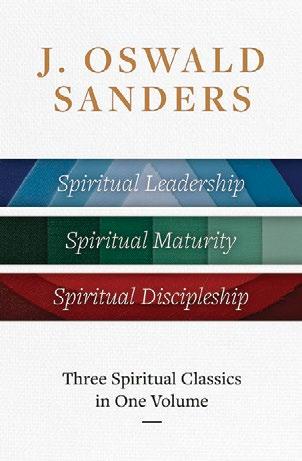
By J. Oswald Sanders [Moody Publishers]
Three classics for every Christian’s library. In this new edition, readers engage with Sanders’ most essential and influential work: Spiritual Leadership, Spiritual Maturity, and Spiritual Discipleship. Let this classic be your guide for leadership and watch how God works through you to do great things for His glory. You can find it at https://www.moodypublishers.com/ j-oswald-sanders-three-spiritual-classics-in-one-volume/

By Trillia J. Newbell [Harvest House Publishers]
Your family is invited to learn about the accomplishments and adversities of twelve noteworthy African American believers. Celebrating Around the Table offers you a new and refreshing resource to help you lead your family and friends in a rich exploration of Black history and the faith we all can share. You can find it at https://www.trillianewbell.com/celebrating-around-the-table

[Zondervan]
Exquisite from the inside out, the NIV Artisan Collection Bible, Large Print invites you to journal or draw alongside Scripture. The beautiful floral cover is designed to celebrate the beauty of the world around us, while the interior features a single-column layout and wide margins for journaling. You can find it at artisanbibles.com

By Robin Wilson and Christy Bottom [Kharis Publishing]
Who is God Now? Hope in God after Betrayal is for the woman whose heart has been shattered by her husband’s unfaithfulness, infidelity, pornography use, emotional affairs, addictions, or any other cause of marital betrayal, and who seeks a Biblical context for both suffering and hope. Available on Amazon. You can find it at https://a.co/d/hEzebZy

By Passion Publishing [Zondervan]
From the Passion movement, The Jesus Bible lifts Jesus up as the lead story of the Bible and encourages you to faithfully follow H im as you participate in H is story. The bestselling pink edition will now be available in both the NIV and ESV translations. You can find it at thejesusbible.com

Walt Larimore, MD, has been called one of America’s best-known family physicians and has been named in the “Guide to America’s Top Family Doctors,”
“The Best Doctors in America,” “Who’s Who in Medicine and Healthcare,” and “Who’s Who in America.”
He’s a former vice president and physician in residence at Focus on the Family, and the American Life League named him a “Rock-Solid Pro-Life” awardee. He’s also an award-winning medical journalist and the bestselling author of over 40 books. He and his wife of 50 years, Barb, have two adult children and reside in Colorado Springs. You can find his daily blog at www.DrWalt.com and follow him on Facebook at “DrWalt.com.” Have questions for Dr. Walt? Email them to editor@ todayschristianliving.org
This column is for informational purposes only, does not constitute health or medical advice, and is not intended to substitute for the diagnosis or recommendation(s) of your healthcare professional(s).
QUESTION: What are some of the New Year’s resolutions that you recommend for your patients.
For decades I have prescribed these Bible-based resolutions for my Christian patients to prayerfully consider:
RESOLVE to love God with all your heart, mind, soul, and strength (Mark 12:30, Matthew 22:37-38, Luke 10:27) and be filled with, that is to be controlled and empowered, the Holy Spirit (Ephesians 5:18). This filling will invariably produce the “fruit of the Spirit” (Galatians 5:22-23). Often Christians think of the “nine-fold fruit of the Spirit,” but I like to think of the “fruit of the Spirit” as being primarily the fruit of love — for God, yourself, and others—that also manifests itself as joy (which is love singing), peace (love resting), patience (love enduring), kindness (love’s helpfulness), goodness (love’s character), faithfulness (love’s habit), gentleness (love’s touch) and self-control (love holding the reins).
RESOLVE to follow God’s will for your life. For example, “Rejoice always, pray continually, give thanks in all circumstances; for this is God’s will for you in Christ Jesus” (1 Thessalonians 5:16-18), “Do not conform to the pattern of this world, but be transformed by the renewing of your mind. Then you will be able to test and approve what God’s will is — his good, pleasing and perfect will” (Rom 12:2), “It is God’s will that you should be sanctified: that you should avoid sexual immorality; that each of you should learn to control your own body in a way that is holy and honorable, not in passionate lust like the pagans, who do not know God; and that in this matter no one should wrong or take advantage of a brother or sister” (1 Thessalonians 4:3-6), and, “It is God’s will that by doing good you should silence the ignorant talk of foolish people” (1 Peter 2:15).
RESOLVE to “Love your neighbor as yourself” (Mark 12:31, Matthew 22:39, Luke 10:27). The “Golden Rule” may be one of the best-known of Jesus’ sayings among non-Christians and is the main point of His moral teachings: “So in everything, do to others what you would have them do to you, for this sums up the Law and the Prophets” (Matthew 7:12). This is the standard Jesus set for dealing with our neighbors. It is called The Golden Rule because Roman Emperor Alexander Severus (AD 208-235) had it inscribed in gold on a wall. This resolution may best be demonstrated by each of us serving others (Mark 9:34-35, 10:42–45, Galatians 5:13–14, 1 Peter 4:10–11).
Although all three of these resolutions can improve one’s physical, emotional/mental, relational/social, and spiritual health — what I like to call “The Four Wheels of Health,” all of which were demonstrated in the life of Jesus (Luke 2:52) — for our 2025 resolutions, I’d like to recommend we each consider how we might be flavorful salt and attractive light (Matthew 5:1316) when we serve our neighbors in 2025. How would it change our neighborhoods, communities, and country if all of us who are followers of Jesus would focus on serving our neighbors in need? Most folks think of neighbors as the people who live near us, but that’s not what Jesus meant. In His famous parable of the good Samaritan, Jesus said to “love your neighbor” (Luke 10:25-37) means to love all persons, everywhere — not just our friends and those who live near us.
Jesus included all mankind — even our enemies — in the word “neighbor.” He made this clear when He taught, “You have heard that it was said, ‘Love your neighbor and hate your enemy.’ But I tell you, love your enemies and pray for those who persecute you, that you may be children of your Father in heaven.” (Matthew 5:43-48)

God has given each of us stewardship over what I call The Four Ts: our talents (Ephesians 2:10), treasure (Haggai 2:8), time (Ephesians 5:16), and temple — our bodies, the temple of the Holy Spirit (2 Corinthians 9:8). We are to faithfully administer these in caring for ourselves and in the service of others. The Bible tells us, “God will generously provide all you need. Then you will always have everything you need, and plenty left over to share with others” (2 Corinthians 9:8 NLT).
The unwise say, “The more I give to others, the poorer I become,” but the opposite is true. Service to others brings meaning and fulfillment to our lives in a way that wealth, power, possessions, and self-centered pursuits can never match. As Jesus said, “Give, and it will be given to you. A good measure, pressed down, shaken together and running over, will be poured into your lap. For with the measure you use, it will be measured to you” (Luke 6:38).
A Biblical principle for a happy (blessed) and healthful life comes with understanding that all God has given us is to be used for His glory—and this happens most lavishly when we freely give it back to Him for others’ benefit. God has given each of us much to share with those in need. As we do, we can be conduits of healing and blessing every day. We received these blessings freely, and freely we are called to give them away—all for the glory of God. Jesus taught us, “Let your light shine before others, that they may see your good deeds and glorify your Father in heaven” (Matthew 5:16).
John 3:16 tells us that “God so loved the world that He gave…” This verse is a revelation of the heart of God and a summation of the meaning of the Christian life. If there’s one
thing the Bible teaches us, it’s that God is love, and that those of us who claim to believe in Him and want to follow Him are to love one another as He has loved us (1 John 4:8,11). And the message of John 3:16 is that God-like (agape) love always gives voluntarily and sacrificially.
So what time, talent, and treasure has God given you beyond your basic needs? A mentor encouraged me, “Ask God to tell you how, where, and to whom you can freely give them away. As you use your time, talent, treasure, and temple to serve others, you will experience the blessed life.” Randy Alcorn writes, “God has entrusted us with wealth that we may voluntarily distribute to those who need it most. Never have so many been in need. Never has God showered such abundance on Christians. When will we learn that God doesn’t give us more to increase our standard of living, but to increase our standard of giving?” (tinyurl.com/yxlo4x5b)
From improving your physical well-being to boosting your emotional, mental, family, relational, and spiritual health in 2025, tending to, caring for, and giving to others (loving your neighbors) does a world of good for your health and the health of those in which you invest time, treasure, talent, and temple.
Most of the time, you can experience the immediate impact of giving your talents, treasure, and time; but it won’t be until heaven that we’ll learn of all the eternal benefits.
This article is excerpted from Fit over 50: Make Simple Choices for a Healthier, Happier You authored by Dr. Walt and Dr. Phil Bishop, published by Harvest House, © 2019, used with permission.

By Jennifer Anne F. Messing
“I’d like to nominate you to be the president of Oregon Christian Writers,” my friend and prolific author, Stanley C. Baldwin said.
I glanced at this energetic and business-like, gray-haired man who had previously served three times as our organization’s president. He kept his eyes on the road, driving the two-hour trek back to Portland from Eugene on that gorgeous, sunny afternoon in May. We’d just attended Oregon Christian Writers (OCW’s) 2002 Spring One-Day conference.
“You’re a talented writer, organized, and motivated. You have what it takes to do a great job as president.” His tone was matterof-fact. “Will you accept the nomination, Jennifer Anne?”
My heart leaped. I couldn’t believe what I’d just heard! Gulp! Me? Serve as OCW president?!
The election was a few months away. Hoping I sounded confident, I said, “I’d like more time to think and pray about this, Stan. I’ll let you know.” Honestly, I was excited to be nominated but felt very intimidated by the thought of leading this state-wide group of approximately 400 writers!
I first attended an Oregon Christian Writers conference nine years earlier. I’d moved to Oregon from Manila, Philippines (my birth country) after my American husband and I were married there. In my late twenties, a wife and a mother of two young girls, I was just starting out as an author. I felt warmly welcomed by this incredible writers’ group and learned so much from the classes offered.
After two years, I had many articles and poems published in various magazines. My childhood dream had come true — I was a published author!
Four years into my journey with OCW, I was elected to the position of recording secretary. I served with a dedicated board under our strong, competent president, author Deborah Hedstrom-Page. I grew in my administrative skills, took meeting minutes, and continued getting published. I served two consecutive two-year terms, the maximum allowed.
I’d established great friendships with many authors and editors and felt comfortable where I was. Then this unexpected nomination came!
The thought of serving as president at age 36, presiding over a board with a few members who were a couple of decades older than me and more accomplished as authors, seemed daunting. Would they follow my leadership? Not only that, my experiences of childhood sexual and verbal abuse — and of my parents’ separation for eight years when I was 14 years old (and their subsequent reconciliation when I was 22) — had left me insecure as an adult. Though I’d done quite well academically, my high school counselor once told me I was an “under-achiever” because my grades did not parallel my SAT and other test scores.
“The hardest part of the job has been the people skills required: overseeing board members who are very opinionated, have unique personalities, and different backgrounds. Often two of them will come to you when they’re having a conflict and expect you to solve their problem. They look to you as the umpire, the one who should provide the solution. And you can’t take sides, or you’ll appear unfair. You’ll need to rely on God and receive His wisdom for how to handle these sensitive situations. Above all, you’ll be the primary spokesperson for OCW and will cast its vision. But I have confidence in you, Jennifer Anne. You can do the job.”
Having my husband’s, Stan’s, and now Debbie’s words of confidence in my abilities was encouraging — but I needed to talk to one last person, the one I always sought when I faced any major decision.
“You’ll need to rely on God and receive His wisdom for how to handle these sensitive situations.”

In early July, I called my dad in the Philippines. My loving father, Salvador Fabregas — my knowledgeable mentor, an attorney and successful businessman who served on the board of seven professional organizations. He’ll have good advice for me, I thought! I told him about being nominated and my hesitation, fearing the position would take up too much time. I’d even considered teaching a women’s Bible study at church instead of taking the position as president.
“What do you think, Dad?” I asked. “Should I accept the nomination?”
Deep inside, I now felt God nudging me to reach new heights professionally by taking on this formidable challenge of serving as OCW’s president. At the time, my husband Michael and I had been married for twelve years and had three children. He was, and is, the kindest, most compassionate man I’ve ever met. Basking in Michael’s tender love for me and in our Heavenly Father’s grace-filled love gradually healed me from my childhood traumas and brought me to a place of growing emotional security.
Holding my hand one evening after supper, Michael looked into my eyes and said, “Jenny Anne, you’re a gifted author and very capable. I’ll support you if you accept the nomination. You can do the job and do it well!”
Two weeks later, in mid-June, I called Debbie, OCW’s current president. I expressed my lingering doubts and asked her, “What has the hardest part of your job as president been?” Chuckling, she answered me in her usual upbeat manner. “I’ll start with what’s been easy: writing my quarterly column for the newsletter and presiding at our board meetings and business meetings at in-person conferences. All of this has been straightforward and enjoyable.” She paused.
“Is there even a doubt in your mind?” my Dad said. “Yes, you should accept!” His optimism shone. “Who nominated you? Give me his phone number, I’ll call him and accept on your behalf!”
I laughed out loud. “But Dad … why are you so sure I should accept?”
“Because, sweetheart,” he said, “you want to be a successful writer, that’s why. Serving as president you’ll work closely with professional writers and meet editors who will help you make your publishing dreams come true. Teaching a Bible study at church is also nice, but that opportunity will probably be available to you anytime. But you can’t serve as OCW’s president anytime you want or when it’s convenient. You can’t predict when in the future you’ll be nominated again. The time is now, it’s a great opportunity. You’ll be challenged and grow immensely. Accept it.”
My father’s wise words sealed my decision. I called Stan Baldwin in mid-August and accepted his nomination.
Two months later, on a brisk fall day in October 2002, inside a college auditorium with approximately 140 OCW members present, I was voted in as our organization’s first ever (and to-date only) Philippine-American president. A thrilling moment!
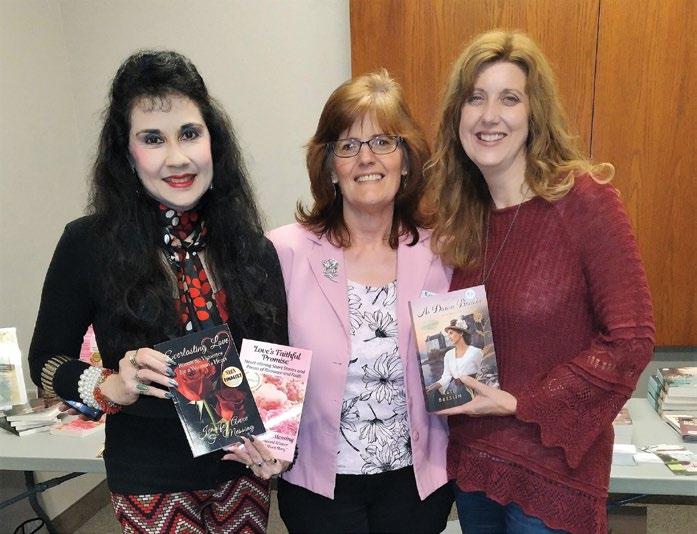

I loved every aspect of my new position and quickly blossomed in leadership, managerial, and networking skills. I learned how to efficiently preside over board and business meetings according to Robert’s Rules of Order. My self-confidence grew.
True enough, as Debbie had forewarned, there were many instances when two board members disagreed about something and I had the difficult job of helping them find a positive resolution to their conflict. There were countless nights I prayed (or should I say agonized?), asking God for wisdom about a specific matter the board was about to vote on, for guidance as we made long-overdue revisions to the outdated bylaws, or who to approach to serve as future officers.
I established lifelong friendships with numerous authors and editors around the country. Mentoring authors and encouraging them to pursue their publishing dreams energized me.
The benefits of serving did not stop when my four years as president ended. The valuable experiences I gained solidified my resolve to become the best writer I can be for God’s glory. I’ve now authored four books plus numerous short stories, articles, and poems and have relished opportunities to teach classes at writers’ conferences. Still an active member of OCW, now known as Cascade Christian Writers (CCW), currently
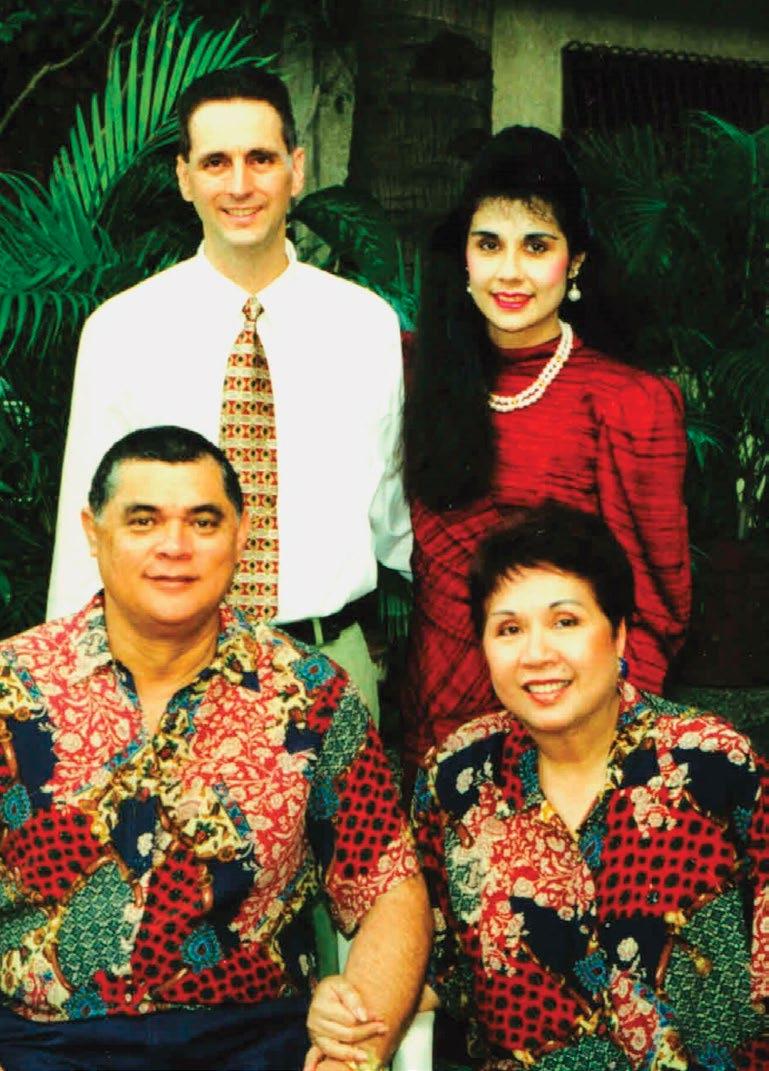
I serve on the leadership team, assisting with media and publicity.
Serving as president enriched my life and career immensely. I learned this profound truth:
“Whoever wants to be a leader among you must be your servant. For even the Son of Man came not to be served but to serve others.”
— Matthew 20:26,28 (NIV)

Jennifer Anne F. Messing is an award-winning author of four books, including Love’s Faithful Promise, and 250 magazine articles/shortstories and poems. She’s a past president of Oregon Christian Writers, now known as Cascade Christian Writers. Philippine-born, she’s a wife and mother of three children. She has a Bachelor of Arts in Communications/ Journalism. You can learn more about Jennifer Anne’s work and/or contact her at www.JenniferAnneMessing.com


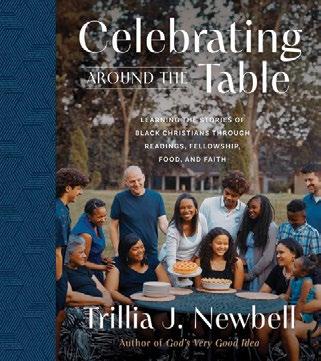

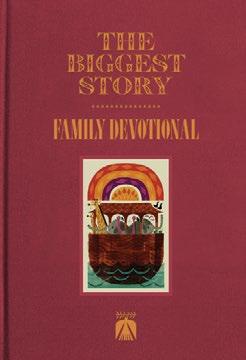






• Audiobooks
• Bibles
• Bible Accessories
• Bible Studies & Curriculum
• Bulk Orders
• Christian Books
• Children’s Products
• Christian Living
• Christmas
• Church Supplies
• Closeouts
• Clothing and Accessories
• Downloads
• DVDs
• eBooks
• Gift & Home
• Gift Cards
• Music
• Pastoral Resources
• Software
• Sunday School
• Gift Certificates
• And Much More!

By B.C. Bond
Pioneer missionary James Scarth Gale’s contributions to Christianity in Korea are evident to this day. How a farmer’s son from Ontario, Canada, undertook an adventure for Christ rests on one moment, early in his life, when he encountered a crossroads to faith.
James Scarth Gale was born on February 19, 1863, in Alma, Ontario. He was the fifth of six children. His mother taught
him to love books while growing up on the family farm. He shared this joy of reading with his family by the fireside during winter evenings. James’ early life was spent working on the farm and attending school in nearby Pilkington Township. James’ teacher, Mr. Sanderson, ruled the classroom with a wooden paddle named Solomon. Solomon’s purpose was to impart wisdom to distracted students. James experi-
enced Solomon’s wisdom more often than others because of his mischievous nature.
One day, James nodded off during one of Mr. Sanderson’s monotonous lectures. The schoolmaster recognized James’ fatigue and allowed him to sleep on a bench in front of the class for the rest of the day, much to James’ embarrassment. But Mr. Sanderson also imparted a love of agriculture and literature to James, which served him later in life.
After graduating from Pilkington Public School No. 1, James attended Elora High School, which stood near the gray cliffs of the Grand River. He enjoyed school but was less enthusiastic about attending church. Every Sunday, the family left the farm at 7 a.m. and drove their buggy to Elora to attend Sunday services. James found Reverend Duff’s sermons long and tedious, filled with firstly’s, secondly’s, thirdly’s, and lastly’s. James would sigh with relief when ‘And in conclusion …’ finally arrived.
One Sunday afternoon, James returned home worried and depressed about religion. Reverend Duff’s sermon about judgment weighed on his conscience. That evening, he attended services in Alma at the red-brick Wesleyan chapel. Here, the atmosphere was more cheerful. Candle sconces crowded the nave’s walls, illuminating the church and providing a warm atmosphere as the choir sang hymns to worshipers filling the pews. James struggled with his thoughts about judgment as the evening’s service began.
months in France during the second semester, studying at the College de France and working for a Protestant mission. He began a diary at this time, which he continued throughout his life.
James traveled to Liverpool, England, in June. He witnessed the world’s harsh realities during his journey through the countryside to London. The contrast between Westminster Abbey’s impressive grounds and destitute beggars struggling to survive galvanized his spiritual motivation for the future. These experiences were packed with his bags when he returned to Paris. It was there he met Reverend William Newell, from New York, director of the McAll Mission at Belleville.
“[James] took a Korean name, Ki Il. Ki meant ‘strange’ or ‘wonderful,’ while Il meant ‘one.’ And so, James’ work in Korea began.”
The McAll Mission or Mission Populaire Evangelique de France’s purpose was to meet local needs through dispensaries and preaching halls. It worked in concert with the French Protestant churches to achieve these ends. Gale was 22 and wasn’t able to preach in France yet, but he did provide whatever help he could, such as working as a pavement advertiser for services the mission provided for the urban poor. The mission’s practical purposes fueled James’ idealism, and his faith anchored him during challenging days in Paris.
James worked long hours and slept fitfully, sharing his mattress with bed bugs. The degrading street life of the poor wore on him. Nostalgic memories of fall harvests with family and friends and the normality of life in Ontario crowded in until he decided to return to University College in the late fall. He took charge of the Elizabeth Street Mission in Toronto for the following two years. It reminded him of his days in Paris.
Then, something Reverend Macdonald said stirred James from his doldrums. Reverend Macdonald’s message was about a boy brooding over and fearing God’s judgment, afraid to unburden his heart to anyone. In spite of his fears, this boy communicated with God through prayer, seeking guidance. Reverend Macdonald’s message dispelled the fears and anxieties James had been struggling with for so long. He would recall those very words later in life, “Have peace of mind. God will deliver you. Faith keeps you. You will not suffer the bondage of fear throughout your life. His words say, ‘He is my refuge and my fortress, my God, in whom I trust. Surely, He will save you from the fowler’s snare.’ (Psalm 91:2 -3) Fear not. God’s judgments are true and just. He is with you.” That was the moment James “caught sight of that heaven to come.” For the first time, James was at peace with himself. This was his first step toward missionary work.
At eighteen, James attended St. Catharine’s Institute for three years. He enjoyed his studies and matriculated to University College, Toronto, in 1884. Here he experienced influential preaching by the famous evangelist, Dwight Moody, inspiring him for his future missionary journey. James spent several
James graduated in 1888 and entered Knox College as a theological student. He heard about the enigmatic Hermit Kingdom of Korea for the first time when he attended lectures by Robert Wilder and John Forman. Korea had only opened to Christian missionaries four years earlier and needed volunteers for mission work there. Friends and colleagues thought Gale would be a perfect candidate for such a mission. James was not sure. He needed time to meditate on such a momentous decision and spent one full night in the varsity building tower in prayer. The next morning, he decided to accept this mission. Though he was not yet ordained or theologically trained, he was granted a salaried appointment for eight years to cooperate with other evangelical denominations already present in Korea. He received his bachelor’s degree on June 12, 1888, and left for Korea in October of the same year.
James Gale arrived in Korea in December 1888 at the age of twenty-five. He entered Seoul through the West Gate, a symbol of the Joseon dynasty’s imperial rule for over five hundred years. But this was a time of plague in Korea. Bodies were piled by the entrance he passed through – all victims of the pestilence. Gale recognized the needs and challenges ahead
and established residency in a simple earthen-walled house far from the royal palace to be closer to everyday Koreans.
James met pioneer missionary Horace G. Underwood, who had been serving in Korea since 1884. He followed Reverend Underwood’s example and took a Korean name, Ki Il. Ki meant ‘strange’ or ‘wonderful,’ while Il meant ‘one.’ And so, James’ work in Korea began. The first summer, he collaborated with Reverend Underwood on a Korean-English dictionary. James’ talents as a translator shone early and would become a major asset to missionaries in Korea.
Missionaries needed dictionaries and grammar texts to help communicate their message of faith to Koreans. Gale recognized the efficiency of the Korean alphabet and its importance for national development. He also acquired an affinity for traditional Korean culture with its mixture of moralizing and fairy tale lore, which he incorporated into his work as a translator and lexicographer. Gale drew a parallel with St. Paul about strength being found in weakness when engaging Koreans. His school days’ gift of mimicry to interpret Korea to Westerners appealed to Koreans.
The significance of James Gale’s successful missionary work lies in its depth. It can’t be measured in churches built, converts made, or literary contributions. It must include his pioneering work as a successful pastorate in Seoul, and through the schools and the YMCA he worked with as well.
So, James Scarth Gale, the son of a farmer, arrived in Korea as a layman, without the backing of a great mission, and became a pioneer missionary, an important lexicographer, a successful translator, and a literary worker on an evangelical adventure for Christ. He was always alive to the needs of the moment, sharing the gospel with all he met. Gale’s passionate faith led him on this journey. And this journey began one evening in a small church in Alma, Ontario, Canada, when he “caught sight of that heaven to come.” for the first time Dr. Gale wrote in his memoirs, after thirty years as a pioneer missionary to Korea, “True religion is the union of heart with God.” Dr. Gale found his heaven to come that night in Alma and it served him the rest of his life.

B.C. Bond is a retired educator living in upstate New York whose writing ministry serves the public through publications such as The Lutheran Digest, Purpose, Message, Young Disciple, Focus on the Family, and Guide magazines. During his career he has taught in public schools, universities, businesses, and as a family educator for Even Start. “Crossroads to Faith” was inspired by his time teaching in South Korea with the Peace Corps.
By Michelle Adserias
On blustery days, I watch the apple branches bending to the wind’s will and listen as they clatter in the winter stillness. I think back to three short months ago. Those ice-covered red apples clung to crisp-leafed branches. And three short months before that? Pink-white blossoms peeked out between newborn leaves. It’s always changing – always bending to God’s purposes.

A friend recently told me, “You’ve changed.” Her tone was accusatory. Maybe it was meant to justify the growing distance between us – or to blame me. Either way, I was devastated!
I’ve changed? Whatever changes she saw, they were costing me a 25-year friendship; a friendship that survived marriages, children, and multiple moves. But today as I watched the apple tree, God reassured me change is a natural thing. Change is a godly thing.
“And do not be conformed to this world, but be transformed by the renewing of your mind…” These are Paul’s spirit-inspired instructions in Romans 12:2. If we renew our
minds, put the old self to death and walk forward in Christ’s likeness, we will bend to God’s will and purposes. We will change. And the people around us will notice, especially those who don’t follow Christ. I didn’t intentionally offend my friend. I lived out my faith, respectfully answered her questions and showed her a loving Savior. She moved through the seasons of her life without Christ. I continued with Him.
I imagine we both changed. But at some point, the changes God made in me became her stumbling block. She walked away.
Sometimes following Christ comes at a temporal cost but the eternal rewards are far greater. That’s what motivated Paul to say, “More than that, I count all things to be loss in view of the surpassing value of knowing Christ Jesus my Lord, for whom I have suffered the loss of all things, and count them but rubbish so that I may gain Christ.” — Philippians 3:8
Lord willing, I have more seasons of life ahead; more opportunities to bloom, bear fruit, and rejuvenate. I pray I will continue to be conformed to Christ’s image. I also pray my friend will come to know Christ so we can grow together.


Ayoung clergyman, fresh out of seminary, thought it would help him better understand the world if he served as a policeman for a while before taking on a congregation.
He studied hard and passed the exams; worked himself buff to pass the physical; and then came the all-important final interview.
One question was: “What would you do to disperse a frenzied crowd?” He promptly responded, “I would pass an offering plate.”
He got the job.
From Mikey’s Funnies [forwarded by Gretchen Patti] www.mikeysfunnies.com
Ihad been walking for miles after my car broke down coming back from a hectic day of exhausting meetings hours out of town. Plus, my phone had died.
Since leaving my vehicle, the weather had turned and I could see a downpour was inevitable before I would find a place to call for help. So, I decided to try hitchhiking.
The first five or six cars passed me by, the drivers staring forward pretending to not see me. But eventually someone did pull over and just in time! As I got into the car the first couple of expected raindrops fell on the hood and windshield.
As we pulled away from the side of the road the driver asked me, “Aren’t you afraid I might be a serial killer?”
Looking dead ahead, I replied, “The odds of two serial killers being in the same car are extremely unlikely!”
The absolute silence in the car, as we travelled to the next town, was the most peaceful part of my whole day!
From Mikey’s Funnies www.mikeysfunnies.com
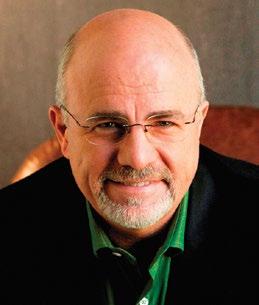
Dave Ramsey is a seven-time #1 national best-selling author, personal finance expert, and host of The Ramsey Show, heard by more than 18 million listeners each week. He has appeared on Good Morning America, CBS This Morning, Today Show, Fox News, CNN, Fox Business, and many more. Since 1992, Dave has helped people regain control of their money, build wealth, and enhance their lives. He also serves as CEO for Ramsey Solutions.
Dear Dave,
We’ve been following your plan for a while. We’re debt-free, except for our home, and we have six months of expenses set aside in our emergency fund. Recently, I lost my job. I’m luckier than some, because I received a generous severance package from my previous employer, plus my wife still has a good job. My parents always raised me to take care of things myself and not rely on others. I suppose it’s because of this I feel a little guilty about filing for unemployment compensation. Do you think there’s anything morally wrong with accepting unemployment benefits?
— Brandt
Dear Brandt,
I really appreciate your self-sufficient attitude. I don’t know what happened at your last job but I’ve got a feeling you’re a hard worker and a decent guy. I’m sorry you and your wife are having to deal with this kind of situation.
The Social Security system in this country is a mathematical failure. But that doesn’t mean I’m not going to take my money when I deserve it. The government took it from me in the first place, so I don’t have a problem with accepting something I’ve already paid into. You’ve already paid for your unemployment benefits!
Now, I’ll throw out a warning here. Sometimes when people start receiving unemployment benefits, it causes them to take their foot off the gas. The idea that “free” money is coming in can help them rationalize sitting at home on the couch, instead of working hard to find another job and being extra careful with their finances. I’m not hearing that kind of mentality from you, though. And it’s obvious you and your wife have been pretty smart with your finances.
One more thing I’d suggest is making sure you look at your severance package as survival money only. Make a strict budget and stick to it. Cut out all excess spending. That means no eating out, vacations or anything like that until you’re working again and everything’s back on solid ground. Right now, focus on covering your Four Walls. By
By Dave Ramsey
that, I mean food, utilities, shelter and transportation. Feed your family, keep the electricity on, pay the mortgage and put enough gas in the car to get where you need to go.
Everyone hits a rough stretch of road in life from time to time, Brandt. But you two are in a position to handle it better than most. Just remember what got you to such a good place with your finances in the first place. The discipline muscle is already there, and it’s strong. Just flex it, and it’ll help get you through this and back on your feet again!
— Dave
Dear Dave,
Do you think it’s a good idea for a small business, one that’s very young but growing, to seek out investors?
Dear Trey,
My advice is to grow your business with organic cash. That may sound like a fancy phrase, but it just means you earn the money with which you’ll grow. This may mean growing a little bit slower. It might even mean passing on a few “big deals” you thought were going to be the best things ever to happen to you and your business. But you want to know something? That’s okay. I’ve turned down plenty of deals like that over the years, and it’s left me firmly convinced it’s better to be the tortoise than the hare.
Think about this. When you sell a piece of your ownership to people looking for a return, instead of caring about your dream, you’re creating the potential for a big mess. A lot of times, these folks will seem like silent partners — an oxymoron in small business. The truth is, most people who’ve put money into your business won’t keep silent. They’re all going to have opinions and ideas and there’s a strong possibility these will clash, at some point, with the vision you have for your company.
In short, I would not recommend a fledgling small business, even one that’s doing well, to seek out investors. Period. Cash flow your growth, Trey. Cash flow equipment purchases and the markets you enter, also. Does this mean you might miss a good opportunity here and there? Sure, it does. But it also means you’ll miss opportunities to fail. Too much success too soon is one of the

biggest reasons small businesses shut down. When you grow too quickly, you run the risk of outgrowing your financial resources, your infrastructure and your human resources. Ensure your company’s growth is steady but play it smart. Don’t grow so fast that you crack the foundation.
— Dave
Dave,
I am the managing partner of a family business. We would like to add to our team but I’m worried we can’t try to hold millennials and Gen Zers to the same standards as other generations without losing them. How do you feel about this?
— Sarah
But you have to provide meaning in the work they do. They want their work to connect with something that matters. They want to be treated with dignity, not like units of production . And they have inquiring minds. Most of them want to know why you do things the way you do them. All that is perfectly okay with me and always has been.
Now, they’re the worst two generations to work for someone who’s just a boss because bosses push while leaders pull. If you’re going to pull, you have to communicate and share a vision that draws people into your mission. Bosses, for the most part, have a “do it this way because I said so” attitude. That’s not going to work with Gen Zers and millennials.
Dear Sarah,
Listen, I’ve got a building full of Gen Z-ers and millennials — and I love them. If you hire the rights ones, you’re getting people who love calluses on their hands and on their brains. They make the interview process easy, too, because there are just two types from these generations: the ones who are unbelievably awesome and the ones who aren’t. But the great ones are not afraid of hard work. They’re passionate, intelligent and mission driven. I mean, they’ll charge the gates of hell with water pistols for something they believe in.
I get where you’re coming from though, Sarah. I’ve still got friends and business associates who tell me we’re going to lose everyone from these generations if we don’t give them things like “the flexibility to work from home” — which really means, “I don’t want to work much” or “I want to work all the time.” Listen, I understand not everyone who works from home falls into one of those two categories, but some do. There are folks who put in 80 hours a week because they can’t put their screens down and live. Or folks who work three hours a day and call it good enough. That’s working part-time hours for full-time pay. And that’s called stealing.
But millennials and Gen Z-ers? I’m a huge fan of these generations. They are, for the most part, genuine, real people and hard workers. If you give them what you should as a leader, they’ll blow you away with their smarts and what they’re capable of achieving!

Will Morris is the Middle East Correspondent for Morning Star News and one of its founding writers. He is an award-winning journalist and photographer whose byline has appeared in numerous domestic and international publications including The New York Times, The Washington Post and even Stars and Stripes
Mr. Morris has spent roughly a decade covering the Persecuted Church and conducting research about freedom of religion - mostly in the Muslim-majority countries in which he lived. He also covers national security and environmental issues.
Will Morris holds a degree in International Studies from the Ohio State University where his coursework focused on the Middle East and Development. He is a veteran of the United States Marine Corps, where he served in the infantry.
You can contact Mr. Morris at veritas@ witnessmedia.org
When people imagine what the average persecuted Christian looks like, I think they picture a convert in some far-off exotic corner of the world quietly living in faith until they are confronted by people who want to hurt, or even kill them because they believe in Christ.
In most places in the world — countries like Pakistan, Nigeria, North Korea, India or Iran — variations of this image are the reality. But as society in the more developed, “secular” post-Christian world continues to reorganize itself in opposition to Christ, Christians in the UK are being persecuted as well, simply for publicly declaring longstanding Christian beliefs.
Other Christians have fallen afoul of the country’s poorly thought-out hate speech or public order laws, used to frame street preaching and other methods of spreading the gospel as hate acts. According to Evangelical Alliance, an interdenominational Christian group in Northern Ireland, it has now harder for someone to “come out” in secondary school as a Christian than it is for someone to come out as LGBT.
Years ago, gender activists and LGBTQ+ groups, who previously and nobly fought to end the harassment of gay men and woman, abandoned the call to “live and let live” and began aggressively demanding acceptance of their sexual choices. They allowed no room for public disagreement. Anyone who publicly dissented from their beliefs was characterized as a hate-filled “homophobic” bigot.
Now, in many circles in the UK, simply following Jesus is seen as a close-minded act of bigotry or a form of oppression. Only the newest versions of Christ, where he is put forward as some allaccepting libertine are permissible. There is no talk of God’s standards, sin, sacrifice or repentance. And educating or reminding people of those standards has cost many believers their reputations, their livelihoods and in a few cases, their freedom.
One such person, Bernard Randall, an ordained minister and former school chaplain, has been in the English court system now for five years, attempting to restore his reputation and livelihood
after being blacklisted by, of all groups, the Church of England.
In 2019, Randall preached a message entitled “Competing Ideologies” about sexual identity classes being taught to secondary students at Trent College in Derbyshire, a CoE-affiliated school where he was employed. The classes were presented by Educate and Celebrate, a now-discredited and defunct radical transgender group. The group called on educators to “smash heteronormativity” among their students, a far cry from encouraging tolerance. In the sermon, Randall responded to questions about the program by telling students it was wrong to discriminate against anyone “simply for who he or she is.” He then said that people who believed in LGBT ideology were “entitled to keep to those ideas” but those who didn’t feel comfortable with it, especially for spiritual reasons, “should not feel required to change.”
“Whichever side of this conflict of ideas you come down on, or even if you are unsure of some of it,” Randall said, “the most important thing is to remember that loving your neighbor as yourself does not mean agreeing with everything he or she says; it means that when we have these discussions there is no excuse for personal attacks or abusive language.”
A week later, Randall was suspended by school administrators, pending an investigation. Two months later, the school notified Randall he would be dismissed.
Randall appealed and termination was stricken. He was given a final warning instead, but censorship of his sermons followed. When COVID struck the UK, Randall was laid off. As conditions returned to normal and other staff returned, the school refused to restore Randall’s full-time status. In December 2020, he was fired again.
In an act of hypocritical audacity, school officials reported Randall to Prevent, a public counter-terrorism monitoring system in the UK, as a religious extremist. Worse still, they reported him to a Local Authority Designated Officer as a “safeguarding risk” or a danger to children. LADOs are responsible, among other things, for investigating accusations of pedophilia.
In 2023, an employment tribunal upheld Randall’s final 2020 termination. However, Prevent, the LADO, the Teaching Regulation Agency and the Disclosure and Barring Service all ruled that Randall was neither a violent extremist nor a safeguarding risk. Still, Randall remains blacklisted by the Anglican church.
On November 12, Randall filed a case with the Royal Courts of Justice to review the CoE decision not to discipline the bishop who blacklisted him. The Archbishop of Canterbury, Justin Welby, declined to discipline or investigate the bishop responsible for the safeguarding. A separate review found the Archbishop’s decisions regarding the bishop’s alleged misconduct “plainly wrong.”
In a last-minute twist, on the same day Randall filed his case in court, Welby announced he would step down as archbishop in the wake of a massive scandal. On November 7, a report was issued about John Smyth, a lawyer who is suspected of molesting or attacking as many as 130 boys and young men. Many of the attacks are thought to have happened at CoE-affiliated youth camps he ran. The report concluded Smyth might have been stopped if Welby had reported the abuse accusations to police after he became the archbishop more than a decade ago. Smyth died in Cape Town in 2018.
The more I learn about Randall’s story, the more I think it is a case of blatant character assassination. Randall had the temerity to tell Trent students they shouldn’t be bullied into believing anything. His sermon was in line with long-held Christian ideas about sexual morality and the official theology of the CoE.
Much like Saul of the Old Testament, the leadership of Trent College and the Anglican Church have chosen a quest to become culturally relevant. Instead, they are on the road to becoming intellectually and spiritually bankrupt. Meanwhile Randall has chosen to “… Earnestly contend for the faith which was once delivered unto the saints.” —Jude 1:3 KJV
“For there are certain men crept in unawares, who were before of old ordained to this condemnation, ungodly men, turning the grace of our God into lasciviousness, and denying the only Lord God, and our Lord Jesus Christ.”
—Jude 1:4 KJV
Randall is hardly alone in his struggles. Accurate estimates of how many Christians have encountered legal troubles for expressing traditional Christian beliefs are hard to come by, but there are a multitude of on-going cases.
Kristie Higgs of Gloucester, a pastoral assistant at a high school, was fired after someone anonymously complained about two personal Facebook posts she made about the Relationships and Sex Education program proposed for her son’s primary school. Higgs was told her posting, where she expressed her
concern about the transgender curricula in the program, could harm the reputation of the school.
In October 2020, a tribunal ruled that Higgs had not suffered from discrimination but in June 2023, the Employment Appeal Tribunal struck down the lower court’s decision and found her right to freedom of belief had not been considered. In October 2024, Higgs’ case was seen before the Court of Appeal. A decision is still pending.
Izzy and Shane Montague have been stuck in a legal battle since 2018, when Heavers Farm school officials tried to force their 4-year-old son to take part in LGBT education, which included marching around the school in a school-run “Pride Parade” while chanting gay anthems such as, “We are Family” and “True Colors” Administrators informed parents that holding the parade was a legal requirement and told one parent it was illegal for their son not to attend. A lower court ruled the event was not promoting homosexuality but part of an overall program to promote equality and inclusivity. The Montagues have moved their child to another school but are still trying to win a harassment case against the school.
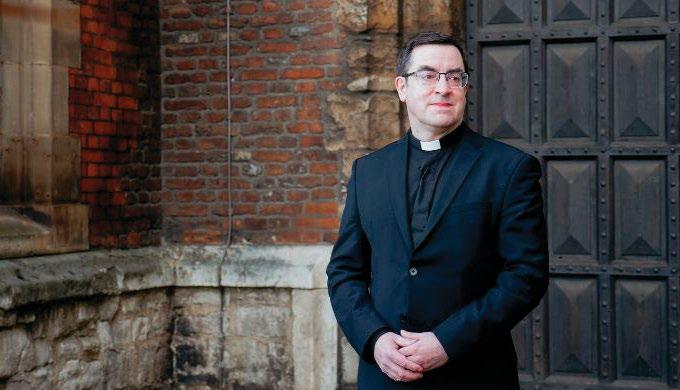
PRAY that God will resolve all the unjust legal cases against Christians in a way that glorifies His name and either brings justice to those involved and/or reveals the true nature of their opponents.
PRAY that God will strike down the laws used unfairly to silence and instill fear in UK Christians.
PRAY that God will protect children in the UK from radical LGBTQ+ activists who use fighting intolerance as a guise to promote what scripture expressly forbids.
PRAY that God will reveal himself in a life-changing way to gay men and women and those suffering from gender dysphoria across the UK.
PRAY that God will pour out his Holy Spirit on all those thought to have been abused by John Smyth. Pray He will heal them and they will come to know His love, power and grace.
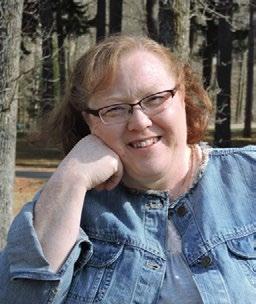
Michelle Adserias is the editor of Today’s Christian Living magazine and relishes every opportunity she has to write. When she isn’t sitting behind a computer, she enjoys hiking, outdoor photography, handembroidery, and playing the piano. Michelle resides in Central Wisconsin with her husband, Peter. They have four grown children and two grandchildren.
Excerpt from Until Then: Journeying Between the Now and the Not Yet by Michelle Adserias
IAdapted from Until Then: Journeying Between the Now and the Not Yet, a 52-week devotional by Michelle Adserias.
Copyright© 2024 by JP Media LLC.

marveled over the beauty and destructive force of an ice storm that moved through. The ice left every tree, every fence post, every rooftop shimmering like glass. Tall, slender white pines bowed toward silverstruck maples, then took up a graceful dance to the wind’s somber music. The colliding limbs clattered like Christmas lights hitting the hardwood floor. It was an eerie sound. Sadly, many of those branches broke under the weight of their eye-catching burden.
Destructive sins often come wrapped in shimmering packages. For me, it’s those ever-tempting chocolates in colorful foil, games with flashing lights calling you to play one more time, and racks of clothes I don’t really need with big 75% Off signs on them.
Whatever sins we fall prey to, they wreak havoc on our bodies, minds, and souls. When we break under the burden of our sinbents, we dance to the music of temptation and are subject to its destructive forces. Since we are powerless to escape sin’s icy bonds on our own, the best thing we can do is avoid it — at all costs. In fact, the Bible instructs us to run! Run like Joseph did when Potipher’s wife tried to seduce him.
Obedience is outward, empirical evidence we’re being transformed by His radical love. God commands the wind and the rain. They obey. God also commands us. Unlike the wind and the rain, we can choose whether to obey. By choosing obedience, we demonstrate our love for God, just as Christ’s obedience to death on the cross demonstrated His love for us. (Philippians 2:8)
By Michelle Adserias
For this is the love of God, that we keep His commandments. And His commandments are not burdensome.
— 1 John 5:3
Sometimes God’s commands seem burdensome. Not only burdensome — impossible! How can we love our enemies? How can we forgive those who hurt or disappoint us? How can we leave our comfort zone to serve God somewhere foreign to us? How can we stand for Christ, even if it costs us our lives? There’s only one answer to such questions:
For the love of Christ compels us, because we judge thus: that if One died for all, then all died; and He died for all, that those who live should live no longer for themselves, but for Him who died for them and rose again.
— 2 Corinthians 5:14-15

The 52-week devotional Until Then: Journeying Between the Now and the Not Yet, is available at todayschristianliving.org/devotional.


Michelle Adserias
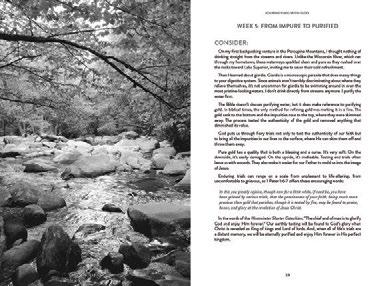

It
One who believes lightly and unthinkably has not much of a belief. He who has a faith which is not to be shaken has won it through blood and tears — has worked his way from doubt to truth as one who reaches a clearing through a thicket of brambles and thorns.


By O’Donnell, DeYoung and Clark [Crossway]


The Bible is a BIG book about the BIGGEST story. Each devotional, based on Kevin DeYoung’s Biggest Story Bible Storybook, tells about the God who created the world, acted in history, and continues to act in the present. These kidfriendly devotions give parents and children hundreds of easy, memorable opportunities to experience God’s story together.
The Biggest Story Family Devotional features 104 Bible stories. Each story includes a brief Big Picture introduction and a Gospel Connection summary to help children understand and apply Scripture. A QR code on each story page links to an animated video retelling that parents and children can watch together. The 104 stories each include 5 individual Bible readings (520 in all) that families can complete whenever they choose — during dinner, before bed, one per day, or several at a time. Each reading has family discussion questions, a prayer, and space for notes.
By Stacey Womack [Self-Published]
Have you been confused about what constitutes domestic abuse? Do you have questions about how domestic violence relates to the faith community? Have you felt lost in how to deal with this issue in your church, your community, or family?
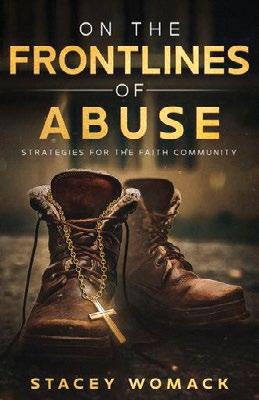
Abuse Recovery Ministry & Services (ARMS) has twenty-seven years of experience in working with both victims and offenders of abuse. Learn from vast knowledge and first-hand experience how to better recognize abusive relationships, how to determine who is the primary aggressor, how to keep victims safe, and how to hold abusive people accountable. Understand what God would want you to do and not do when trying to help others. Learn more about ARMS at www.abuserecovery.org
By Dane Ortlund [Crossway]
When Christians struggle with sin, they can easily feel that God is close to giving up on them. But in Matthew 11, Jesus describes himself as “gentle and lowly in heart,” longing for believers to find rest in him. The good news of the gospel flows from God’s deepest love for his people.
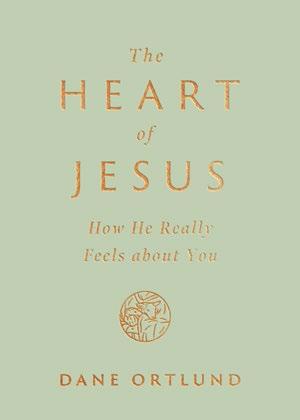
In this concise book adapted from the bestselling Gentle and Lowly by Dane Ortlund, readers will encounter Jesus’ tender heart for sinners and sufferers. Written for a wide audience — including younger readers, new Christians, and anyone who struggles with reading — it features easy-to-read terms and helpful explanations. The chapters are also short enough to read at bedtime, around the dinner table, or during lunchtime. The Heart of Jesus dives deep into Bible passages that speak of who Christ is, comforting and sustaining readers with the affections of Christ for his people.
By Janine Rosche [Revell]
How far would you go to fix your mistakes and regain the trust you lost? For Jade Jessup, the answer is 2,448 miles. Once a trusted financial advisor, Jade lost her credibility when her fiancé (and coworker) stole millions from their clients. Now she’s agreed to help one of them –an aging Hollywood starlet named Berenice “Benny” Alderidge – seek financial restoration.

Jade sets off on Route 66 with Benny and her handsome adult foster son, who is filming a documentary retracing the trip that built the love story between Benny and her recently deceased husband. Jade recalls memories of her own darker association with Route 66, when she was kidnapped as a child by a man the media labeled “monster” – but she remembers as “Daddy.”
Together, all three will learn about family, forgiveness, and being freed from the past. But not before Jade faces a second betrayal that changes everything.
By Rebecca St. James and Cubbie Fink [DavidCCook]
With authentic storytelling and hard-won wisdom, this couple illuminates the heartaches and triumphs that shaped their story.
Journey with Cubbie and Rebecca and discover hope for your own story as they wrestle through questions like:
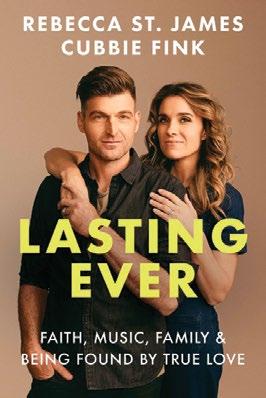
• How does God redeem life’s big losses?
• How do we find healthy identity outside of what we do and what people think of us?
• How can we best honor our marriage and love our family through difficult seasons?
• On the mountaintops and in the valleys, how do we build an unwavering, lasting ever commitment to God?
Through honest conversations about singlehood, marriage, the purity movement, and living in the spotlight, Lasting Ever offers hope to all of us who face challenges but long to embrace life with a heart attuned to God’s grace.
By Trillia J. Newbell
[Harvest House Publishers]
Your family is invited to learn more about the accomplishments and adversities of twelve noteworthy African American believers, including Frederick Douglass, Elizabeth Freeman, Harriet Tubman, and some others you don’t know but should.


Each chapter of this unique cookbook contains:
• a brief biographical sketch of a historical Black Christian
• a devotional reflection based on the person’s life or a lesson from their story
• engaging discussion questions for you and your children
• insightful prayer prompts to lead you closer to the Lord
• delicious Southern recipes inspired by African American history and Trillia’s momma’s kitchen
Celebrating Around the Table offers you a new and refreshing resource to help you lead your family and friends in a rich exploration of Black history and the faith we all can share.
By Natalie Runion [DavidCCook]
In recent years, we’ve seen the “great resignation” in church leadership and attendance, the devastation of spiritual abuse, and the breakdown of faith within our culture.
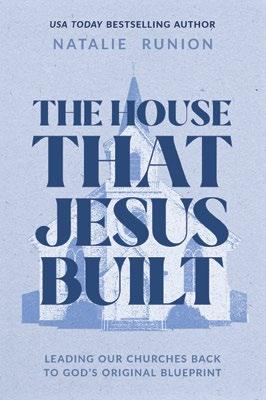
In The House That Jesus Built, Natalie encourages all of us to recognize our role as Jesus’ disciples in rebuilding our churches, brick by brick. With personal stories and practical ideas, she guides us to:
• Be honest about past disappointments while engaging with our churches
• The pain we have caused and how we can help each other heal
• Use the book of Acts as the blueprint for empowering the family of God
• Be unified on the foundation of Jesus Christ
The House That Jesus Built will stir your heart to see God’s churches realigned with the great commission and the great command. We are the Church. We can partner with the Rock to build something beautiful from the rubble.
y Merdith Davis and Billy Young (illustrator) [Waterbrook]
What happens when a seemingly average seventh grader discovers he has superpowers . . . and then realizes his life just got super complicated?
As a baby, Noah Minor miraculously—and mysteriously—survived a fall from a sixteen-story balcony. But ever since then, Noah’s life has been pretty boring.

As he enters seventh grade, Noah is hoping to be less ordinary and more extraordinary, like his best friends; trumpet prodigy Rodney and the practically perfect Haley. Noah’s sure his star is on the rise when, during a standard vision test, he learns he can manipulate gravity and is soon after recruited to train with Gravitas, a top-secret government agency!
Noah thinks his life will be awesome. Instead, he has a whole new set of problems. The biggest one: His great-uncle Saul is on Gravitas’ most-wanted list – but might also be the only person who can help Noah reach his full potential.
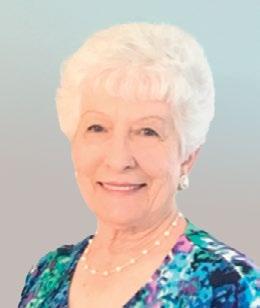
Bea Anthony is a Christian resident of Abilene, Texas. She is a mother, grandmother and great grandmother and so very proud of the results. Bea has been a member of the same country, community Christian Church for 50 years where her husband, Wade, also served as an elder. They were married for 63 years.
At one time, I frequently traveled a regular highway route in my home state of Texas. I soon began to notice a decaying, two story house with two fireplace chimneys still intact. Old, abandoned houses pique my interest. They are but a shadow of times gone by, leaving any and all secrets forever in the past. How could one not wonder about the history of such places?
That this one had formerly been a place of elegance was still apparent. It seemed only reasonable to think it had once provided the warm, secure shelter of a place called home for a family. I felt sure it had a lively past with quite a story to tell. Had all of this been forgotten by those it served so well? It now stood empty and forsaken in a state of decay.
By Bea Anthony
choose complete denial of things that we don’t want to face. Sometimes, if truth doesn’t please us, we simply rationalize it away or don’t think about it at all, lest it threaten our comfort zone and disturb the peace.
For me, it was a scary, disturbing thing to face the truth of the reality that I, too, would come to the end of the road in this life and that my body would then face death and decay. Though I always knew this in the recesses of my mind, my chosen reality was the very small world of this life and whatever was going on around me as I lived it. I lived as if I would live forever.
“I lived as if I would live forever.”
As I continued passing that way, my curiosity grew and my imagination began working overtime. I envisioned that old house as it must have been in its earlier days, with a busy life within those walls. I imagined it full of family, with children being born and growing up there. I imagined hearing their laughter as they enjoyed life together.
That old house began to move me with a sense of loss. I was actually beginning to grieve for its demise. Why was I feeling such loss for a decaying old house beside the road? It had never been part of my life or ever meant anything to me.
After returning home from one of those trips, I composed a poem expressing my sadness for the deteriorating condition of that old home place. Organizing my thoughts to write the poem cleared the brain fog I had allowed my imagination and emotions to create – enabling me to see a more complete picture of what that old house truly represented.
Though just standing there beside the road, slowly disappearing, it was showing itself as evidence of God’s plan to anyone who might notice and view it with understanding. It was demonstrating that everyone and everything is only temporarily passing through this life.
Sometimes, in our personal sense of reality, we
Yet, accepting death and this body’s decay fell short of the complete picture I needed to grasp and accept as reality in this moment of truth. We, as mankind, trump all else in nature. We alone are born with immortal souls that escape death to live forever. Life doesn’t end for us with death and decay of the body. The soul sheds the shell of mortality and goes home, where there is no death or decay.
Life here moves only in a forward direction with no takebacks or do-overs. Yesterday is gone, today is short, and tomorrow we too will be gone. The Lord gives and the Lord takes away in his own timing. Everything belongs to Him and He makes the calls!
My encounter with that old house brought home to me that my life here is only a brief stay as a short term resident. It inspired me to move in closer to God and to do it today; to do it right now!
“So teach us to number our days that we may get a heart of wisdom.” - Psalm 90:12
I’m sure some have very fond memories of that old house as a wonderful home. I’m sure that it served them in its day like a faithful friend and that their hearts visit it often in sweet memories of having grown up there. Like all else in God’s creation, it had a purpose in His plan. It also served to impact the life of a highway traveler with only a passing view.
*That old house has recently collapsed.

